#ivan stepanov
Text

so many gay people here call it a pride parade
#dostoevsky demons#demons dostoevsky#alexei nilych kirillov#ivan pavlovic shatov#pyotr stepanovic verkhovensky#nikolai vsievodolovich stavrogin#darya pavlovna shatov#lizaveta tushina#dostoyevski#fanart#artists on tumblr#marya lebyadkina#demons#my art
22 notes
·
View notes
Text
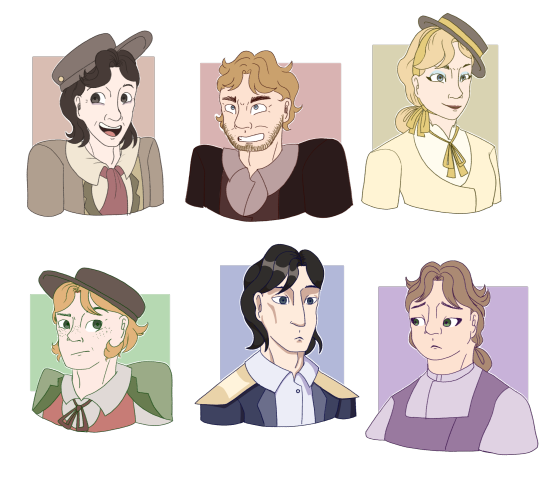
The main Demons six, as always lmao
But this time it’s me attempting a new style
#dostoevsky demons#demons dostoevsky#alexei nilych kirillov#ivan pavlovic shatov#pyotr stepanovic verkhovensky#nikolai vsievodolovich stavrogin#darya pavlovna shatov#lizaveta tushina#dostoyevski#fanart#artists on tumblr
7 notes
·
View notes
Photo

"Designers (Draftsmen)" by Ivan Stepanov (1967)
270 notes
·
View notes
Text

Illustration from Jean-Paul Marat and his Struggle against Counter-Revolution by Ivan Stepanov, 1924
48 notes
·
View notes
Text
Stranger Things Kamchatka Review (and my thoughts on the Russian arc as a whole)
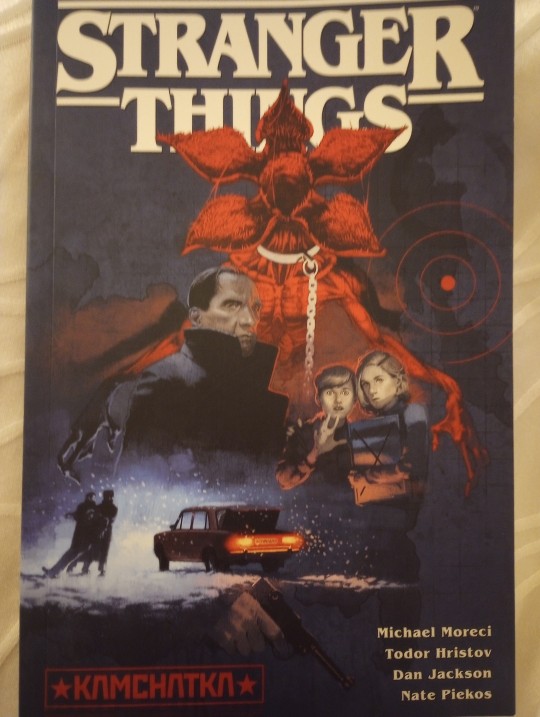
Warning: The following review contains MAJOR SPOILERS from the comic, as well as season 4 of Stranger Things!
If you haven't yet, be sure to check out my other Stranger Things Reviews:
Stranger Things Six
Stranger Things Halloween Special
Stranger Things The Other Side
Stranger Things Zombie Boys
Stranger Things The Bully
Stranger Things Winter Special
Stranger Things Tomb of Ybwen
Stranger Things Into The Fire
Stranger Things Science Camp
Stranger Things "The Game Master" and "Erica's Quest"
Stranger Things and Dungeons and Dragons
Synopsis: In dark wintry Russia, Soviet scientists and military personnel oversee a new weapon they hope to use in their Cold War against the United States: A Demogorgon. To this end, they have enlisted the help of Dr. Boris Orlov to give them a device that will allow the monster to maintain its full strength. However, when Orlov refuses them and hides the device, he is taken prisoner to Kamchatka where the Demogorgon is being held. Now, with the help of an ex-KGB agent named Mr. Frost, it's up to Orlov's children, Anna and Lenoid, to save their father and prevent the device from falling into the Kremlin's hands......
Observations:
This is going to be a different review from what I usually do. The first part of this will discuss the comic itself and its merits/flaws, whereas the second will give more details about my thoughts concerning the Russian arc from seasons 3-4 and its placement on the show.
Part 1: The Comic
There are two ways I judge this comic: As an individual story, and how it ties into the Stranger Things universe.
In regards to the former, the comic works well as a thrilling Cold War spy narrative. It's fast-paced, the fight and chase scenes are intense, and it manages to capture the paranoia of living in the Soviet Union during a time when your words and actions were monitored and there was the constant threat of the KGB coming to arrest you for being a traitor to the motherland.
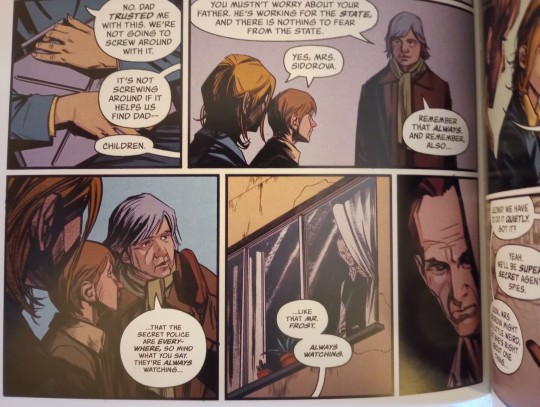
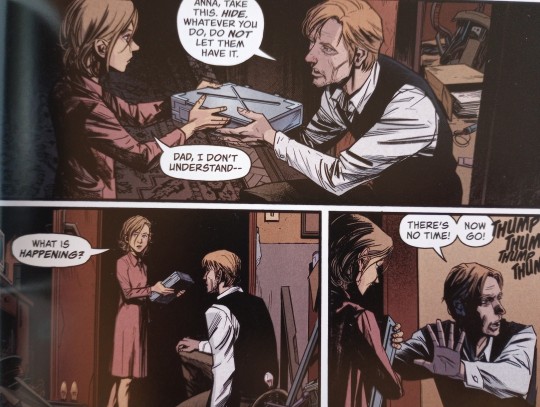
The artwork is impressive. From the white and grey hues depicting the bleak endless winters of Russia, to the ominous red and orange lighting of the prison, this comic does a great job with its dark colors and use of shadows to creepy effect:
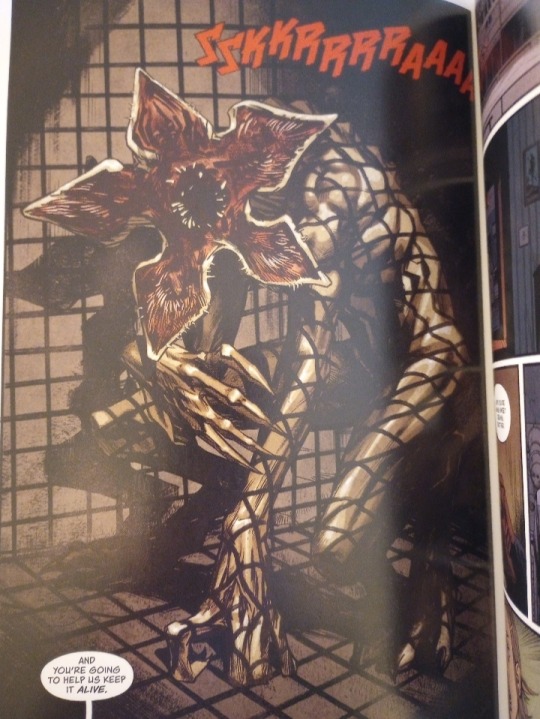
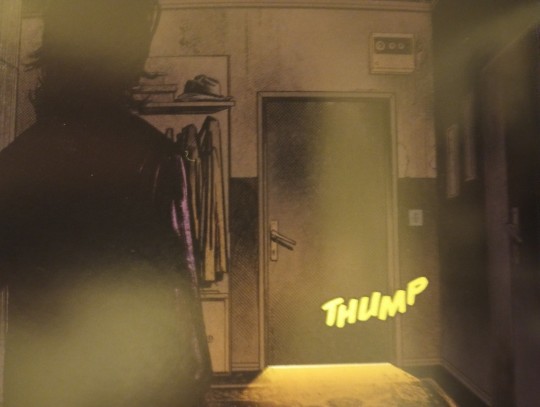
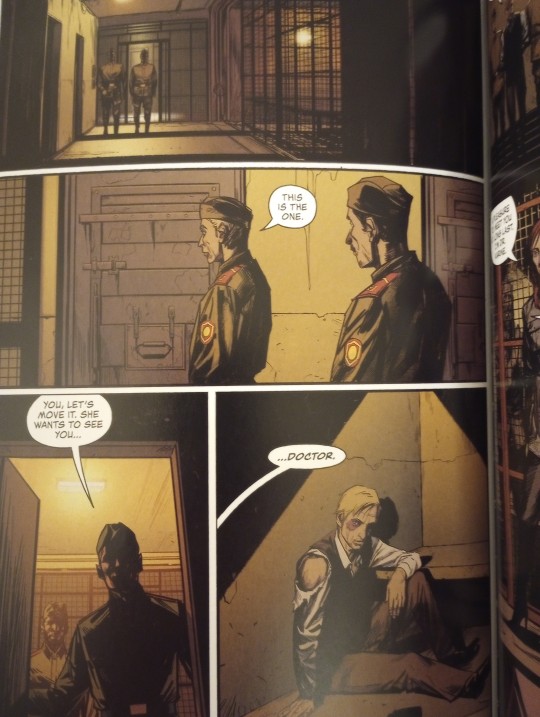
On top of that, this is arguably one of the most violent comics in the series, which is saying something given the show it's based on. They do not shy away from depicting graphic scenes here:
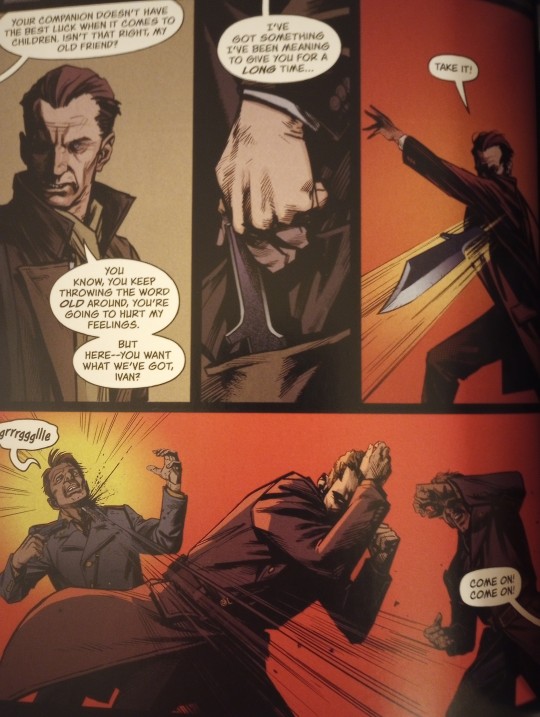
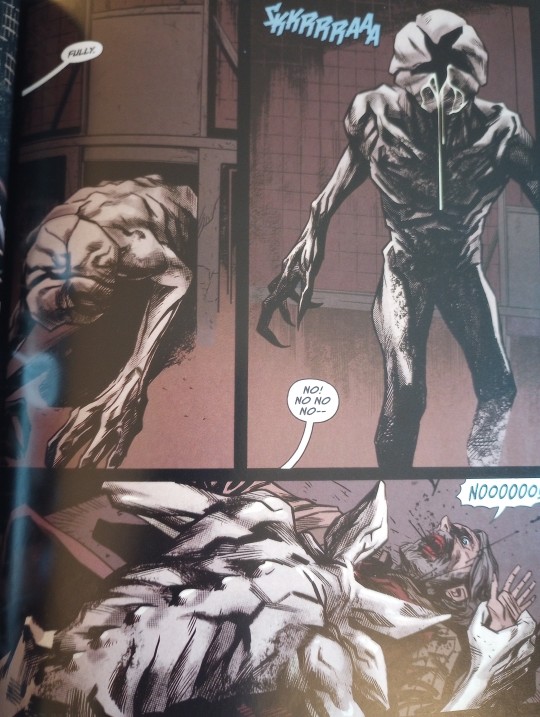
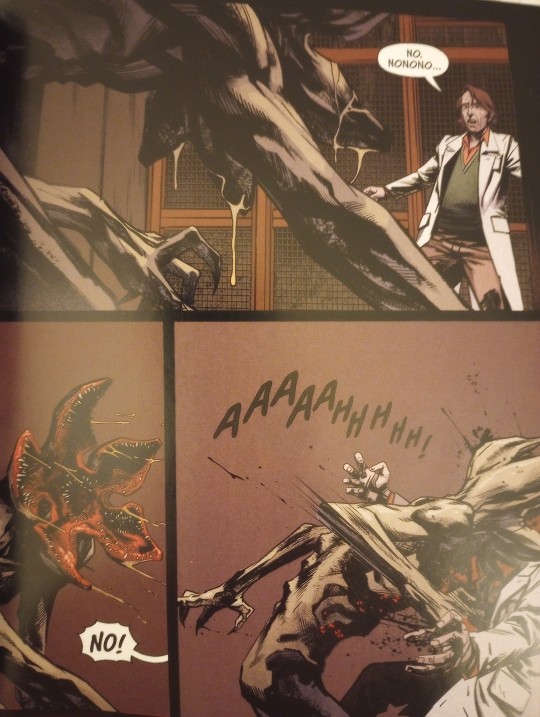
The way the Demogorgon attacks its prey reminds me of the viciousness the Xenomorphs from the Alien series displayed towards their victims. Given how 80s movies like Aliens served as inspiration for Stranger Things and for the design of the Demogorgon in the first place, this was likely a subtle nod to that. The comic writers and artists know how to utilize the Demogorgon for all its scariness and brutality. Considering the same people for this comic have written another story (The Voyage) featuring the Demogorgon stalking and killing the crew of a freighter ship (which sounds similar to the plot of the first Alien movie), they're planning on milking the monster for all it's worth.
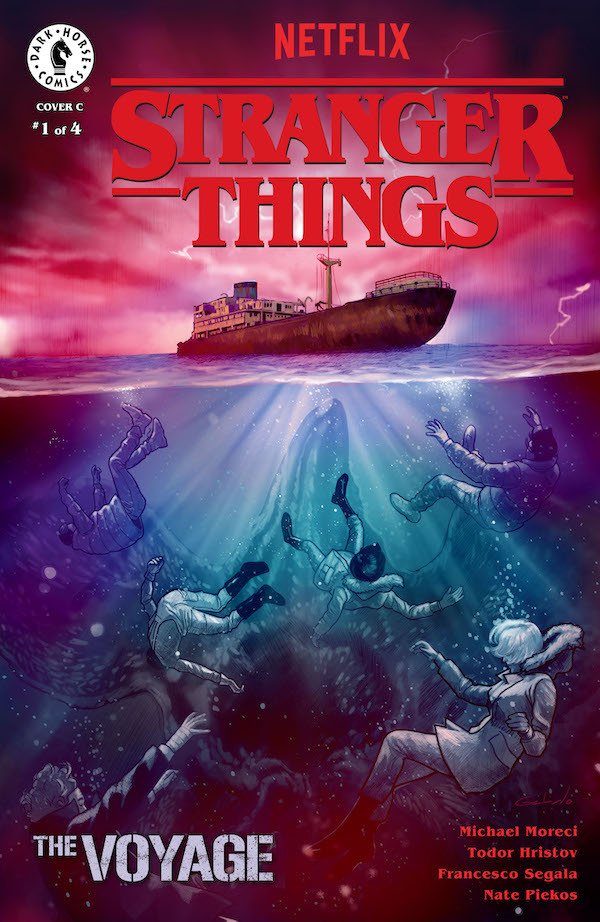
There are two main antagonists besides the Demogorgon: The first is Ivan Kolochev, who comes across like Darth Vader if he was a Russian KGB agent. He's the one who hunts the kids in order to get their father's device, and it's revealed he was the former protégé of Mr. Frost during the time they both served the Kremlin. Ivan later turned on Frost for becoming soft in his eyes, which forced Frost to go into hiding and abandon his wife and daughter for their own safety:
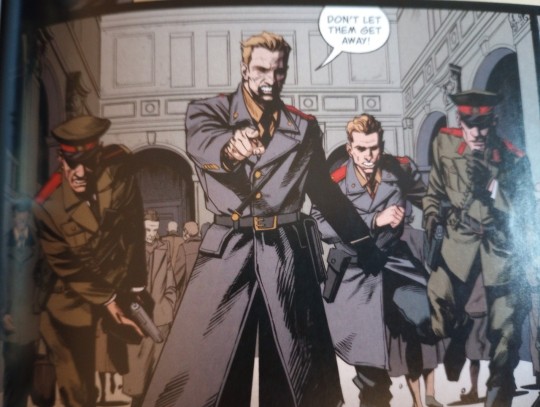
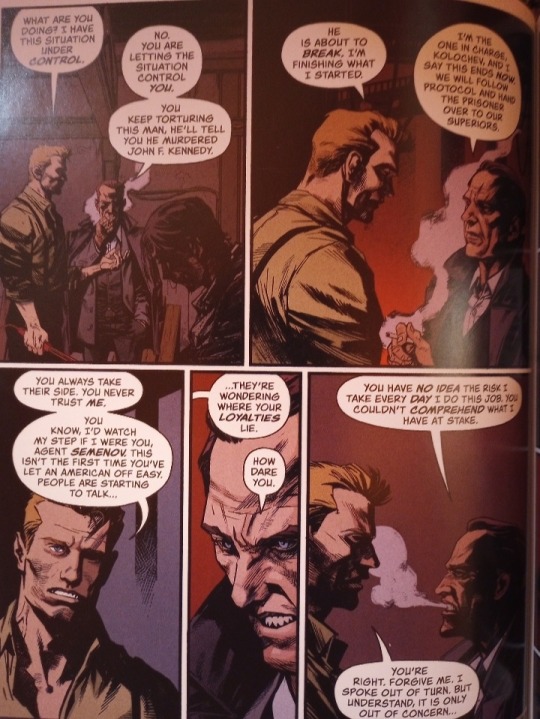
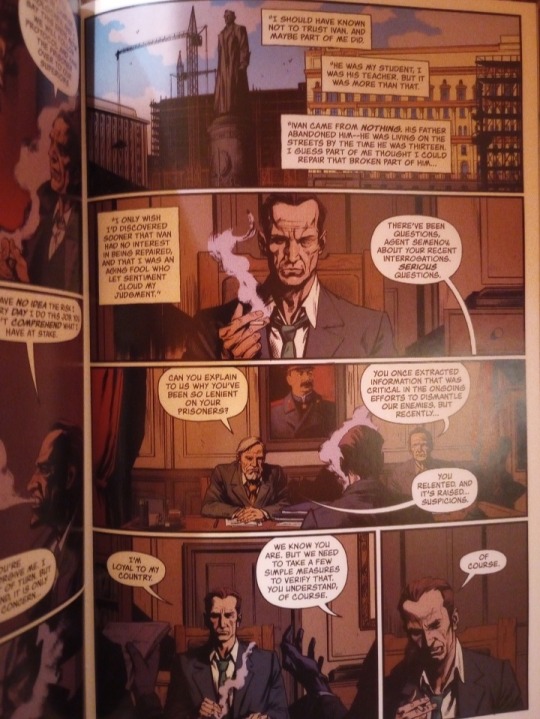
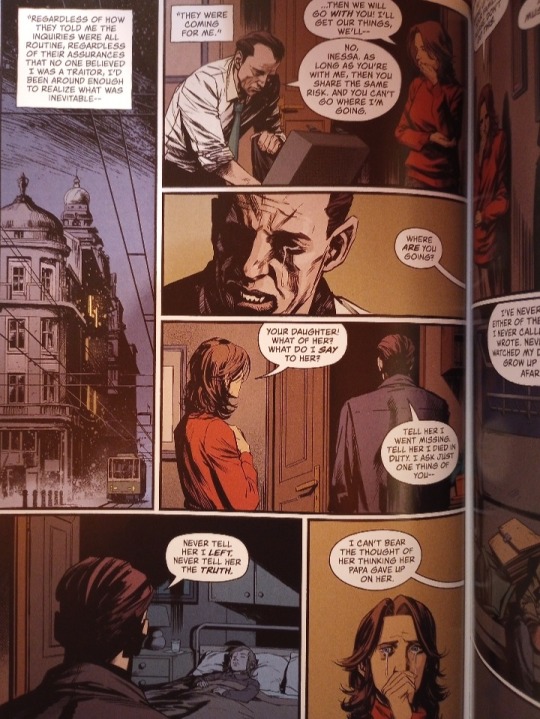
The second antagonist is Dr. Karine. She's the one overseeing the Demogorgon at Kamchatka, and was revealed to have worked under Alexei and General Stepanov when they first tried (and failed) to open the gate to the Upside Down on June 28th, 1984. She was one of the survivors from the blast, and later discovered a pollywog that she nursed into adulthood:
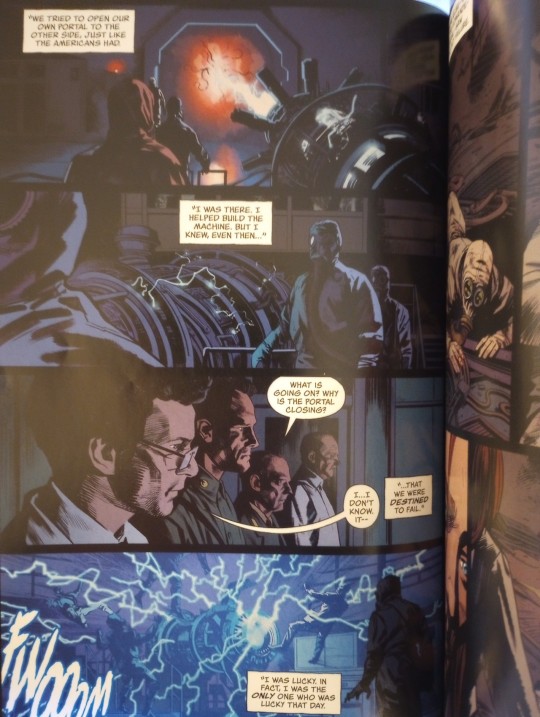
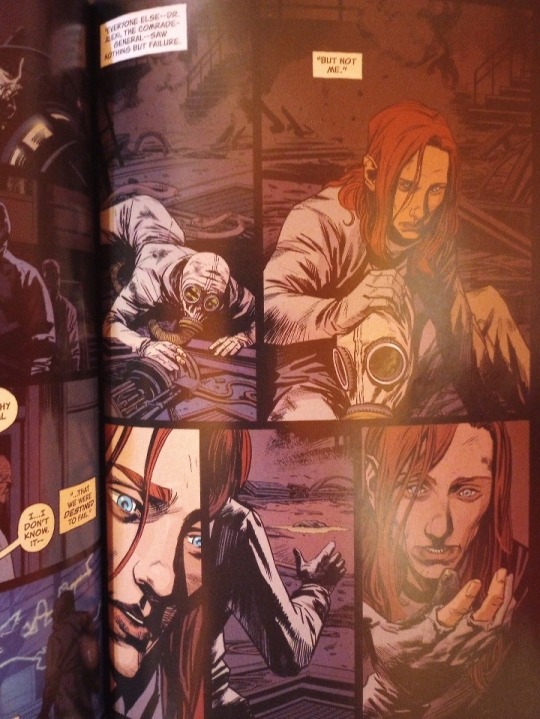
Best way I know how to describe her is she's similar to Dr. Irina Spalko from Indiana Jones and the Kingdom of the Crystal Skull in their ruthlessness, their desire to advance the Soviet Union's cause, and their fascination with abnormal branches of science. They even look physically similar in some respects:
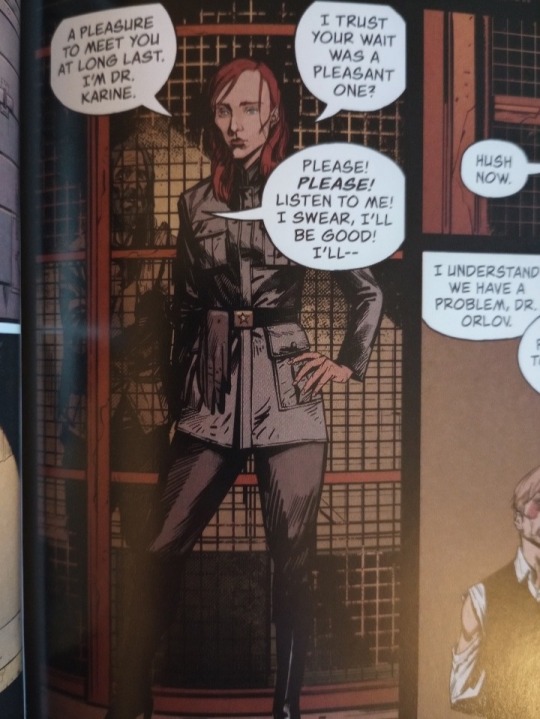
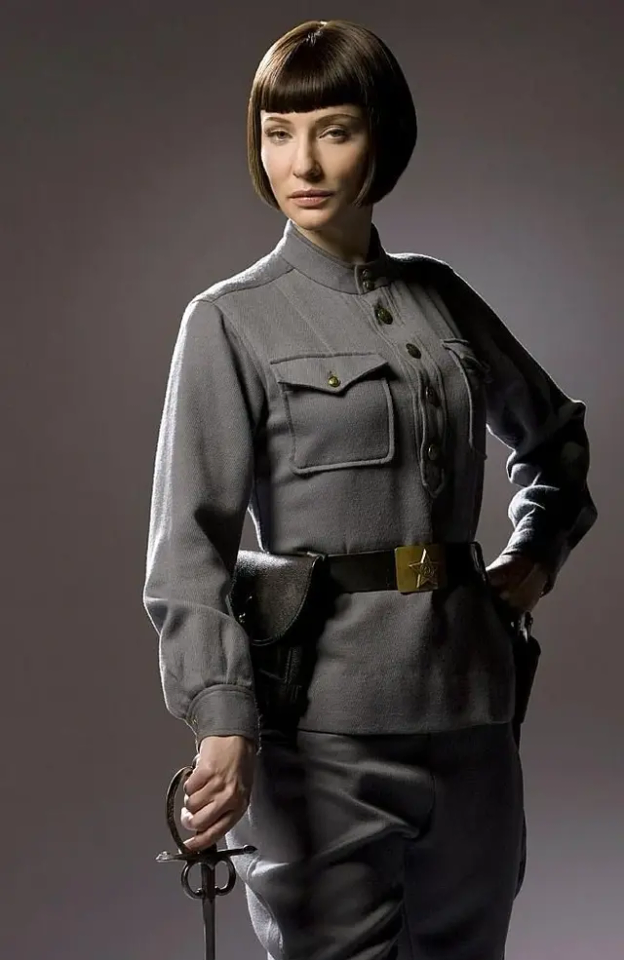
In terms of the main characters, Mr. Frost was the interesting one. A man who ran from the KGB for 15 years and was skilled enough to survive and help two kids who were out of their depth. The story behind him abandoning his family for their safety was sad, and his reunion with daughter later on is heartwearming:
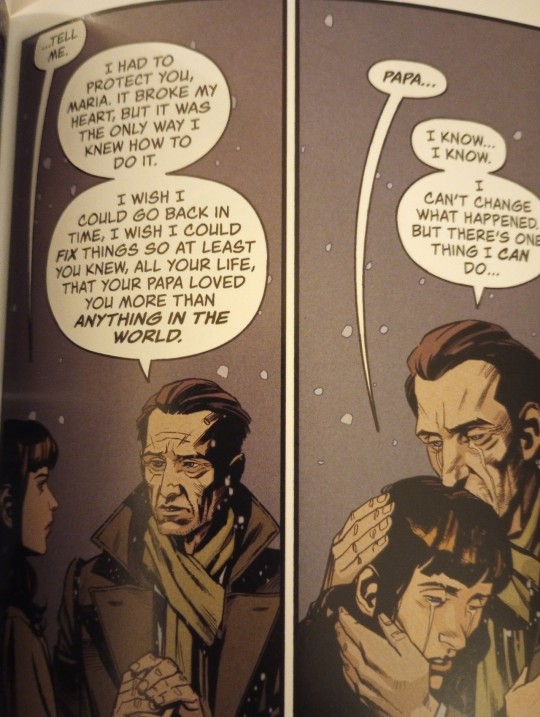
My only criticism of Frost is I wish they'd gone more in depth about his mindset. He tells the kids at the beginning of the comic he's disillusioned with what his country has become, and flashbacks show him becoming lenient in his interrogations, which gets him in trouble with the Kremlin. However, they never elaborated on how he got to that point. They never clarify if he began developing empathy for the Americans who were being tortured by the KGB, if he became tired from years of interrogating prisoners, if he began to fear he was turning Ivan into a monster by taking him in as a pupil, or if something else happened that made him re-evaluate his beliefs.
There's also his relationship/rivalry with Ivan. From the way Frost tells it, he raised Ivan like a son when he found him on the streets and took him in, only to later be betrayed by Ivan because he would "take the Americans side" whenever Ivan tortured prisoners. At the end of the comic though, Ivan accuses Frost of caring more about the rules and the state than about him, suggesting he felt Frost personally betrayed him.
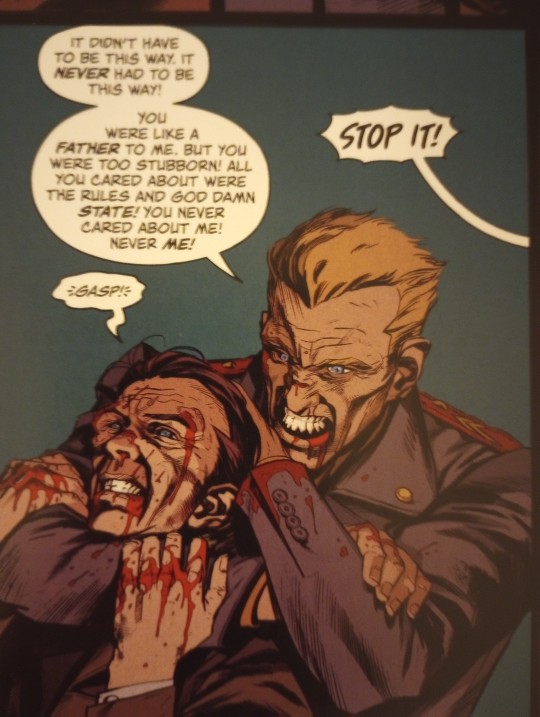
Maybe it was intentionally written to be vague and let the audience decide who was more at fault for Ivan's descent into sadism, but considering we don't get many scenes showing what Ivan and Frost's relationship was like before they fell out with one another, it comes off like an aspect of the story (and Frost's character) that wasn't properly fleshed-out.
As for the kids and Dr. Orlov, they're pretty flat as characters. Anna and Lenoid have scenes showing they care for one another, but they don't really have personalities beyond them trying to find their father. Same for Dr. Orlov: Aside from one moment where he briefly delays Dr. Karine's plans by screwing over another scientist, he's basically a Damsel in Distress (or in this case, a Dude in Distress) waiting to be rescued. There isn't a lot to these characters that's engaging.
And this brings me to the crux of the problem I have with this comic: Setting it in the Stranger Things universe.
If this was just an individual Cold War thriller taking place in Russia, that would be one thing. In fact, I argue this comic works better if it isn't tied to Stranger Things. Just tweak a few plot details, change the Demogorgon to a different monster, and you have an original and unique story. By trying to shove it into the Stranger Things narrative, it creates a whole host of issues.
For one thing, it's highly unlikely Dr. Orlov or Anna and Lenoid are going to make a canonical appearance on the show. Because of that, it's hard to get invested in them or their story, and it doesn't help that the two characters who were interesting (Frost and Ivan) die at the end of the comic. There's maybe the possibility of Dr. Karine showing up in season 5, but since she made no appearance in season 4 during the Kamchatka arc, I seriously doubt that.
I've said this before, but I'm tired of them focusing on characters who either aren't important to the main plot, or aren't canonically part of the show. I'm not opposed to them doing a comic set in Russia, but it should help enhance the ongoing story and characters from the show instead of being a pointless side detour with Easter Eggs sprinkled in.
Take Hopper for instance: He spent 8 months imprisoned at Kamchatka prior to season 4. Why not write a story that focuses on his time there and how he learned to survive the harsh conditions of the prison and his torture by the Russians? Why not give more details about how he met Enzo/Dmitri, how they came to trust each other, and how they formed their initial plan for Hopper to escape?
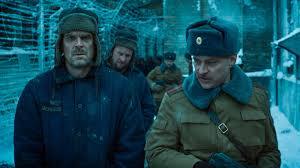
For that matter, why not have a comic focused on Enzo/Dmitri? They could go more into detail about his life as a prison guard at Kamchatka, his relationship with his son, and so on.
Same with Yuri. I don't particularly like his character, but he at least was relevant to the show, and has a backstory as the "Peanut Butter Smuggler" that's ripe with potential.
They did this with Will and Bob in Tomb of Ybwen, and they did this with Dustin and Suzie in Science Camp, so I don't see why they couldn't have done that for either Hopper, Enzo, or Yuri.
Then there's the plot involving the McGuffin: A device created by Dr. Orlov that amplifies telekinetic abilities which Dr. Karine wants to keep the Demogorgon alive. Long story short: The Demogorgon is slowly dying because it can't live in our world and needs to be connected to its source (the hive mind) which the device allows it to do.
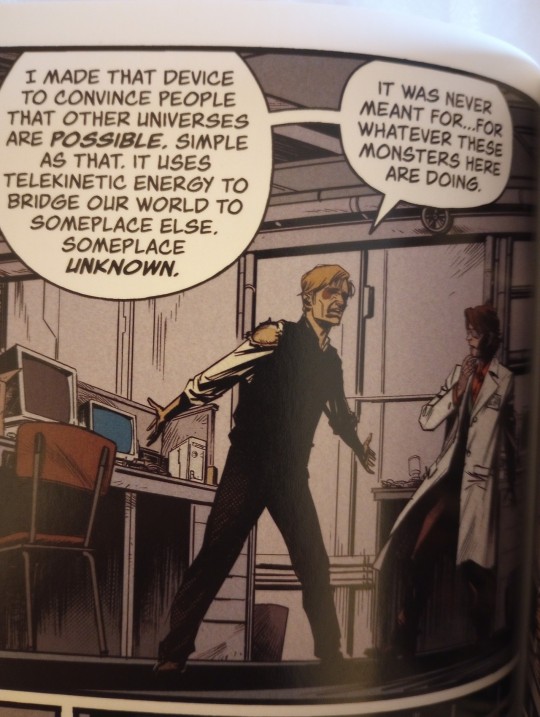
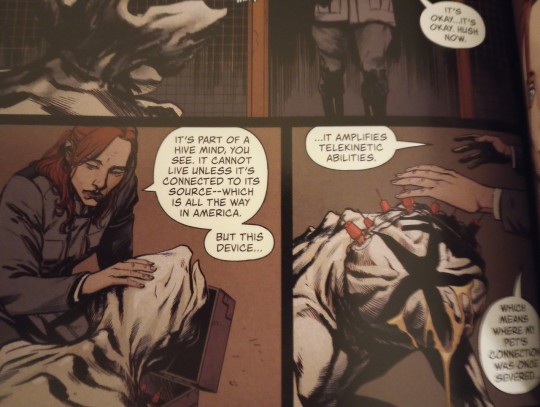
Now maybe I'm remember this wrong from the show (and feel free to correct me in the comment section if that's the case), but my understanding was that Demogorgons, Demodogs, and anything infected by the Mind Flayer (which was revealed to be controlled by Vecna) would cease living if the gate closed. There was a whole deal made in season 2 about getting the Mind Flayer particles out of Will before El shut the gate at Hawkins Lab because he would die otherwise.
However, when it comes to the Soviet's Demogorgon, I was under the impression it wasn't infected by the Mind Flayer, which is why it was still alive once the Russian Gate closed in season 3.
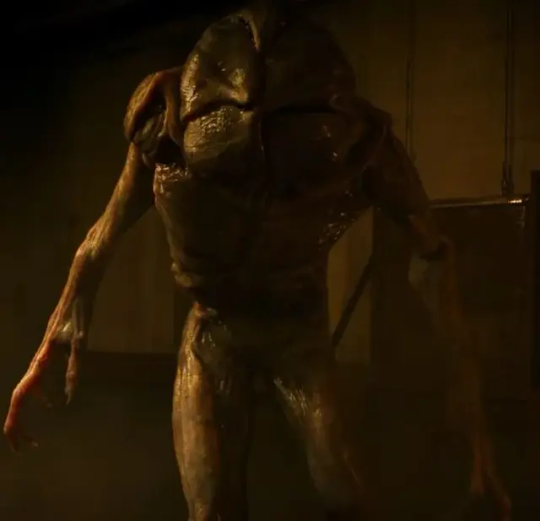
Same thing for the Demodog on the operating table that was being vivisected: My impression was it didn't have the Mind Flayer particles in it either, which is why it was active before Hopper shot it.
All of this makes the telekinetic device used to keep the Demogorgon alive look like a major plot-hole. The Soviet Demogorgon is never seen wearing the device once on the show, even though the comic puts a major emphasis on needing to wear it to survive.
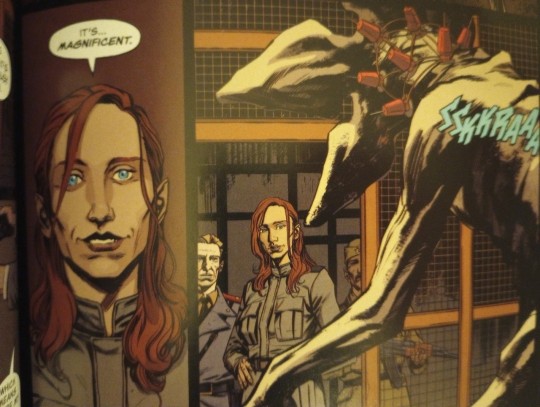
It seems like an unnecessary element to the mythology given the show didn't bother to include it, and it's one I don't care for.
(Side Note: This is a question that's bothered me for a while now, but was the Hive Mind already a part of the Upside Down before Vecna arrived there, and he simply hijacked it when he used the black particles to create the Mind Flayer? Or did Vecna create the Hive Mind by forming the Mind Flayer and using that to infect almost every living being in the Upside Down and link their minds to his?)
Overall, my feelings about this comic are mixed. Some aspects like the artwork, the tone, and the Cold War setting work well, but the characters aren't memorable and the attempts to link the story to the Stranger Things Universe is handled in a clumsy way.
Part 2: The Russian Arc
When it comes to the Russian Arc in seasons 3-4. I know the general consensus has been fans questioning the point of it, with feelings ranging from indifference to outright negativity. In many ways, I get it. Out of all the directions they could have gone with the main story, this is not one I expected them to go either, and I'm still wondering whether there's a future payoff coming that will make it all worth it.
That being said, I don't hate this arc like some people do, and I even know a few people who like it. My dad for instance, who grew up in the 50s and 60s during the height of Cold War paranoia and the fear of Russians infiltrating the United States, thought the show did a good job recapturing those feelings and memories. He also liked how the show emphasized how the danger of the Upside Down wasn't just limited to Hawkins, and that it was important to show Vecna as a threat worldwide. I can see his perspective, and it has made me reevalute some aspects of the arc again, but my feelings still remain mixed at best.
I know when Season 3 came out in 2019, there was a podcast with the Duffer Brothers and producer Shawn Levy giving details about their reasoning for introducing the Russians:
Shawn Levy: “We’ve seen the Americans and now the Soviets trying to harness the power that seems to reside in the Upside Down through that gate. We’ve seen both sides of the Cold War now try to tap into it and control it in order to weaponize it so it felt like a really compelling way to take a real-world fear, an actual authentic historical paranoia, and to mix it with a very specific sci-fi genre plot that is unique to Stranger Things.”
Matt Duffer: “We always struggled a little bit with the U.S. government as the bad guys because there’s only so many times you can punch and/or kill U.S. government or military personal before you get locked away in America. So in a sense, they [The Russians] were an easier human villain because we could do a lot more with them.”
On paper, the writers wanting to explore themes relating to the Cold War and delve more into the paranoia surrounding the Red Scare wasn't a bad idea on its own. The way it was executed on the show, however, left a lot to be desired.
I'm not a fan of how the Russians were depicted in season 3. Not only did they come off as cartoonish buffoons and stereotypes, but they weren't threatening as antagonists. I never got the sense of menace or the intimidating presence I felt when Dr. Brenner or Colonel Sullivan's men showed up looking for El and anyone associated with her. And compared to villains like Dr. Brenner and Vecna, who evoked feelings of fear and revulsion, I felt no similar emotions for the Russians because I had a hard time taking them seriously. My suspension of disbelief breaks whenever I think too hard about how they were able to build their underground base at Starcourt Mall in less than a year. They were portrayed in such a bumbling manner that I didn't buy it.
Even Alexei is a character I'm not a fan of. There was always something irksome to me about the show portraying him in a childlike, naive manner in spite of the fact he knowingly opened a portal to a different dimension to capture monsters to use as weapons, which ended up getting a bunch of people killed in the process. The ONLY thing I liked about this arc was the formation of the Scoops Troop and the interactions between Steve, Dustin, Erica, and Robin.
Season 4 is different: Part of this may be due to a different perspective considering this season came out 3 months after the real life Russian Invasion of Ukraine, but the Russians were creepy compared to the previous season. There was a sadistic, cruel inhumanity to the way they acted that made them menacing. The vicious torture of Hopper. The pit where prisoners were fed to the Demogorgon and the whole thing being treated for sport by the guards. The lack of any basic human rights for the prisoners at Kamchatka. Even the vivisection of the still-alive demodog was horrifying. There was a brutality from the Russians that was chilling to watch, and it made them more insidious than before.
I liked the Russian arc in season 4 better than season 3. I enjoyed Enzo/Dmitri's character and loved the friendship that developed between him and Hopper. I liked seeing Hopper's character development where he became more level-headed and introspective compared to how impulsive and hot-headed he was in season 3. I enjoyed the break-in to the prison and how reminiscent it was of video games like the Resident Evil and Outlast series in tone, setting, and sense of danger. I also loved both fights between Hopper and the Demogorgon, despite how corny some people claim they were.
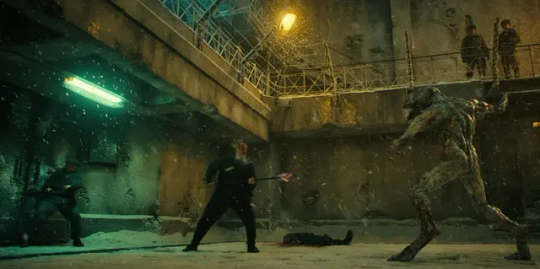
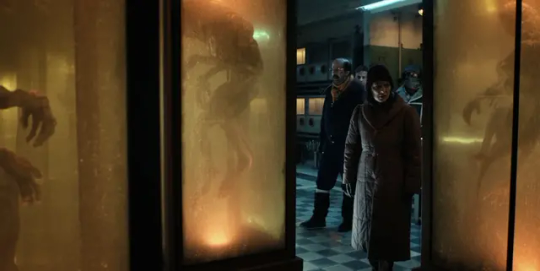
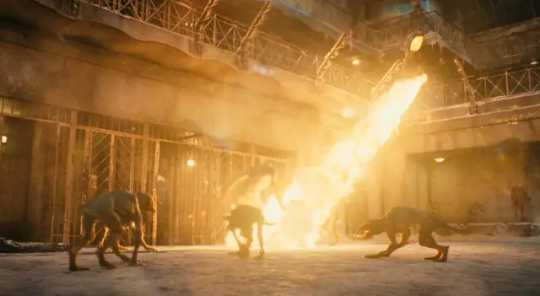
Just because something has flaws doesn't mean it can't have good elements to it as well. Compared to controversial arcs from other TV shows, this one had enjoyable moments, and it's not one I mind rewatching again.
I acknowledge that all of this is my personal opinion, and I don't speak for everyone in regards to how they feel about the Russian arc.
I also recognize there are still questions that need to be answered for season 5. Like how the Russians found out about the Upside Down in the first place: Was there a mole at Hawkins Lab that Dr. Brenner was unaware of, or did they discover it through other means? How did they get that piece of the Mind Flayer into the glass case without getting infected by it? Is Kamchatka the only facility that houses monsters from the Upside Down, or are there others? Do the Russians know about Vecna? What happened to Enzo and Yuri, and are they coming back? Will the Russians return to Hawkins to exact revenge for the destruction of their facility at Kamchatka, or to try and capture more monsters from the Upside Down?
In spite of these questions, I am willing to give the Duffer Brothers the benefit of the doubt in believing they will tie this together. As I've said before, I'm still looking forward to season 5! :)
#stranger things#stranger things kamchatka#stranger things comics#jim hopper#dmitri antonov#enzo#yuri ismaylov#demogorgon#demodogs#vecna#the mind flayer#tgh opinions#tgh reviews#the duffer brothers#stranger things season 3#stranger things season 4#dr. karine#alexei#alexei stranger things
28 notes
·
View notes
Text
The Blacklist - Exclusive interview with David E. Harrison (June 2024)
The broadcast of The Blacklist has concluded on Italian television. James Spader is currently on a work hiatus, and we thought it was the perfect time to give you a little gift.
Exclusively for the followers of Italian Spader Web, we are publishing an interview (in both Italian and English) with actor David E. Harrison, better known to The Blacklist viewers as Ivan Stepanov, a recurring character in the eighth season and crucial to Raymond Reddington's past.
David kindly agreed to answer some of our questions, and now that the series has ended, he shares insights and stories from the show's set.
To read the full interview:
https://sites.google.com/view/harrison-interview/english

#davidharrison#theblacklist#jamesspader#raymondreddington#meganboone#diegoklattenhoff#amirarison#hishamtawfiq#harrylennix#jonbokenkamp#johneisendrath#tvseries#skyitalia#rai2#nbc
5 notes
·
View notes
Text
So now that I've finally watched The Blacklist series finale ...
... I thought I'd share my Top 15 favorite episodes out of all 10 seasons it was on the air.
What? I fangirl hard. I won't apologize for that. 😏
Don't worry. I didn't just remember all of these episodes off the top of my head. I basically did a series 3-9 rewatch last fall before the final 10th season started. Then, I did a rewatch of the first 2 seasons while the 10th season ran because I couldn't remember some of those details they kept referencing.

Enough dilly dallying. Let's dive in, shall we?
Btw, these are in chronological order, and I've pinched the brief descriptions of each episode from IMDB.com:
Luther Braxton (s2, e9)
The task force tries to save Red when he's arrested and taken to a secret detention facility. At the facility, Red tangles with a thief with whom he shared a complicated history. Guest star: Ron Perlman as Luther Braxton
T. Earl King VI (s2, e14)
A former paramour involves Reddington in a deadly game with a wealthy and powerful family dynasty whose ill-begotten fortune was amassed from an underground auction of human and material contraband. Meanwhile, Tom takes on a new mission.
Marvin Gerard (s3, e2)
As Liz pleads for her safety in the Russian Embassy, Red discovers a new plan devised by the Cabal to kill her. A familiar face reaches out to Ressler. Guest star: Fisher Stevens as Marvin Gerard
Kings of the Highway (s3, e8)
Red and Liz are separated when Red falls into a perilous situation. Elsewhere, Samar makes a risky choice to help Liz, and Tom and Cooper continue their quest to exonerate Liz.
Mr. Gregory Devry (s3, e11)
With her name finally cleared, Liz attempts to reclaim her former life. Red works with the task force to infiltrate an assembly of high-level criminals at large in a rare, risky opportunity to capture the heads of the world's most lethal organized crime syndicates. Guest star: Jake Weber as Gregory Devry
The Apothecary (s4, e15)
Red has to figure out who betrayed him when he's poisoned; Liz and the task force look for the toxin's designer to save Red's life. Note: Even though season 4 had my favorite "Big Bad" of the entire series, I could only choose one episode from this season to include in my top 15.
Abraham Stern (s5, e11)
Red goes on the hunt for a legendary treasure; Liz studies the methods of one of the Blacklist's most dangerous criminals. Guest star: Nathan Lane as Abraham Stern
The Osterman Umbrella Company (s6, e14)
Red directs Liz to investigate a secret organization of assassins hired by global intelligence agencies to eliminate former agents, a case with ramifications that will change the task force forever. Note: This episode is probably the one that broke my heart the most. If you've seen it, then you'll know why.
Cornelius Ruck (s7, e12)
Secluded on a private island, Red reunites with an old flame and a ring of thieves in a plot to make millions off of stolen art. Plans are quickly derailed, however, when guests on the island mysteriously show up dead. Guest star: Joely Richardson as Cassandra Bianchi Note: I really liked this one as a nice one-off from the usual formula the show followed.
The Wellstone Agency (s8, e6)
Red and Dembe go to great lengths to fulfill the final wishes of a dear friend; Aram goes undercover as an interpreter to a company that provides services to criminals; Park helps a friend in trouble. Note: The sweetest goodbye I've ever seen a TV series give to a recurring character since The Big Bang Theory.
Anne (s8, e13)
Red enjoys a quiet visit with a friend at her home in rural America. Note: Another great one-off with an ending that made me hate Liz even more than I already did.
Ivan Stepanov (s8, e17)
Red tries desperately to rescue an old friend at all costs, while Liz and Townsend conduct an interrogation. Guest stars: David E. Harrison as Ivan Stepanov and Rana Roy as Priya Laghari
The SPK (s9, e3)
A new case involving stolen artifacts reunites Red with a former Blacklister. Aram faces a difficult decision. Guest star: Stacy Keach as Robert Vesco
Eva Mason (s9, e14)
While searching for Senator Panabaker's missing daughter-in-law, the task force learns there may be a larger pattern of abductions. Red continues to piece together the mystery behind Liz's death. Guest star: Lea DeLaria as Nurse Binstock
The Four Guns (s10, e3)
An assassination attempt on Sen. Panabaker leads the Task Force to a group of renowned pickpockets; Red sends a dangerous gift to an old friend in custody. Guest stars: Stacy Keach as Robert Vesco and Jacob Pitts as Quentin Dodd Note: The scene between Reddington and Quentin where the latter "reads" the former on command and almost perfectly characterizes him is one of my favorite scenes of the entire 10th season.
And that's it folks! I've liked a lot of episodes over the show's run, even when Liz made me want to pull my hair out or when the writing was not as strong as I hoped.
But these 15 episodes above are probably the ones I would recommend to someone who has never seen the show, but wants to know what I liked about it so much that made me stick with it until the end.
As I mentioned before, season 4 had my favorite major villain (aka "Big Bad") but I only picked one episode from that season to add to this list. And although I think season 8 was the most infuriating in terms of characterization, it actually had a lot of great episodes that I would watch over and over again.
I think it's interesting that I didn't have any episodes from season 1 on my list. 🤔
I'm not going to review the series finale or the show overall. I just wanted to mark the occasion and say that I'm happy to see the show sunset, and I will be forever grateful that it gave us 10 years of James Spader on my television.
Yes, I hated that they didn't answer any of my questions about who Red really was to Liz, but I'm still feeling very, very grateful because this character was one for the ages.

9 notes
·
View notes
Text
I demoni

Scritto da Dostoevskij tra il 1871 e 1872, pubblicato l’anno successivo.
È uscito a puntate sul “Messaggero Russo”.
Contesto storico.
C’era un crescendo di atti terroristici, di idee rivoluzionarie e di generale insoddisfazione della popolazione. Credo sia conseguenza di ciò che successe in Europa dal 1789 al 1848-1849.
Il 21 novembre 1869, infatti, lo studente universitario Ivan Ivanovič Ivanov viene ucciso da una cellula rivoluzionaria capeggiata da Sergej Gennadjevič Nečaev (autore insieme a Bakunin dell'opera Catechismo del rivoluzionario). Il processo di Nečaev provoca scalpore in tutta la Russia e si conclude con la condanna del colpevole a 20 anni di carcere.
Struttura
Parte prima, 5 capitoli
Parte seconda, 10 capitoli
Parte terza, 8 capitoli
Circa 750 pagine
Edizione Oscar Classici 2021
Personaggi
Stepan Trofimovič Verchovenskij.
Precettore di Liza lavora alle dipendenze di Varvara Petrovna, di cui è grande amico di lunga data. È simbolo della vecchia generazione di intellettuali, poeta fallito, esteta. Protagonista delle prime 100 pagine, poi sparisce un po’, torna alla grande per la parte finale. Padre di Petr Stepanovič.
Nikolaj Vsevolodovič Stavrogin.
Il vero protagonista del romanzo. D. lo annuncia dalle prime pagine ma lo fa entrare in scena solo dopo pagina 130-140. È malvagio, carismatico, solitario, tormentato, con un passato oscuro.
Pëtr Stepanovič Verchovenskij.
Il secondo protagonista del romanzo. Figlio di Stepan Trofimovic è infido, manipolatore, incoerente, “entusiasta”. Forma una cellula terroristica di nichilisti. Idolatra Stavrogin, odia il padre (e un po’ tutti). Ambisce al potere.
Ivan Pavlovič Šatov (Šatuška).
Studente ex nichilista che vuole uscire dall’organizzazione di Petr Stepanovic proprio per aver cambiato idea. È stato in america con Kirillov, con il quale non parla più.
Aleksej Nilič Kirillov.
Nichilista estremo; intellettuale, lucidissimo. D. lo ritrae come il “nichilista perfetto” che, in quanto tale, ambisce al suicidio. Personaggio più complesso e sfaccettato di quanto non sembri.
Varvara Petrovna Stavrogina.
Madre illusa e ignara di Stavrogin, amica e padrona di Stepan Trofimovic. Ha preso in casa Liza, figlia di una sua grandissima amica. È famosa in città, ricca, aristocratica.
Anton Lavrentievič G… v. Il narratore in prima persona.
Lizaveta (Liza) Nikolaevna Tušina.
Ragazza innocente, fresca, bellissima. Vive in casa di Varvara Petrovna. Il suo arco narrativo è scostante ma impreziosisce tantissimo il romanzo.
Julia Michajlovna von Lembke
Andrej Antonovič von Lembke
Coniugi a capo del governo provinciale (si può dire così?). Entrambi diventano protagonisti nella parte del gran ballo. Prima e dopo, spariscono. Sono utili per lo scopo, diciamo.
Semën Jakovlevič Tichon
Sacerdote ortodosso. Viene introdotto solo in un capitolo utile per un'importante confessione di Stavrogin. È un personaggio che D. tratteggia in poco spazio alla perfezione. È umano: difettoso come tutti.
Fëdor Fëdorovič (Fëd'ka).
Assassino evaso dalla Siberia.
Virginskij;
Šigalëv;
Sergej Vassil'evič Liputin;
Ljamšin;
Tolkačenko.
Fanno parte del quintetto, la cellula terroristica nichilista messa in piedi da Petr Stepanovic. All’inizio non sono personaggi chiari e ben definiti. Con somma maestria D. tratteggia i loro caratteri facendo parlare le vicende del romanzo. “Vogliono creare il paradiso in terra in cambio della rinuncia alla libertà; la loro idea è quella di produrre una società di schiavi dominati dalla paura nei confronti di un piccolo gruppo di governanti, che debbon controllar l'intero sistema ed utilizzarlo ai propri fini.”
Prima parte
Fino a pagina 140
Ho iniziato questo romanzo qualche mese fa, desideroso dell’effetto “Karamazov”; poi l’ho abbandonato.
L’ho ripreso in mano ieri, 1 dicembre 2023, intorno a pagina 110.
Le prime 100 pagine sono di larghissimissima introduzione a Stavrogin, passando soprattutto dalle vicende di Stepan Trofimovič Verchovenskij.
Lento, lentissimo. Si capisce chiaramente che è una lunga introduzione, ma un po’ i nomi, un po’ il fatto che l’ho iniziato nel momento sbagliato, non sono riuscito a proseguire per arrivare al punto.
Un po’ di confusione sui personaggi, davvero troppi e “sparsi” (senza legami familiari particolari).
Il libro, al momento, mi sembra slegato. Tante faccende relazionali, crisi nervose, impacci. Poi un capitolo filosofico messo lì a caso in mezzo al nulla. Ho l’impressione sia sfilacciato.
Frasi
P 122
“Ma quelli che si uccidono per raziocinio, quelli ci pensano molto”
“Ci sono anche quelli che lo fanno per raziocinio?”
“Moltissimi. Se non ci fossero pregiudizi, sarebbero di più. Moltissimi. Tutti”
P 123
“La completa libertà ci sarà solo quando sarà lo stesso vivere o non vivere. Ecco il fine di tutto.”
P 124
“Chiunque vuole la libertà fondamentale deve avere il coraggio di uccidersi. Chi ha il coraggio di uccidersi ha svelato il segreto dell’inganno. Non c’è altra libertà. È tutto qui, non c’è altro. Chi ha il coraggio di uccidersi è DIO. Ora ognuno può far sì che Dio non esista e non esista niente. Finora non l’ha mai fatto nessuno.”
“Ci sono stati milioni di suicidi.”
“Ma mai per fare questo, sempre con la paura e non per questo. Non per uccidere la paura. Chi si ucciderà soltanto per uccidere la paura diventerà subito Dio”.
Da Capitolo quarto parte 3 fino a alla fine della prima parte
P 193
“… oppure perché una nuova idea spendeva ora nel suo sguardo?”
P 198
“Nikolaj Vsevolodovic a Pietroburgo conducive una vita, come dire… sarcastica”
P 199
Però N.V., come a farlo apposta, ha incominciato a eccitare ancora di più quel sogno”
P 200
“Insomma, poniamo che da parte di N.V. tutto questo non sia stato che il capriccio, la fantasia di un uomo precocemente stanco… e infine ammettiamo pure che, come diceva Kirillov, questo sia stato un nuovo esperimento compiuto da un uomo ormai sazio con lo scopo di sapere fino a che punto si possa portare una donna storpia e pazza”
202
Varvara che non capisce la malignità del figlio; come molte madri farebbero
P 214
Petr Stepanovic recita una parte, dice l’autore; ancora non sa quale, ma recita una parte.
P 218
Di rabbia in N.V. ce n’era forse più che in tutti e due messi insieme, ma era una rabbia fredda, calma e, per così dire, razionale, cioè il genere di rabbia più ripugnante e terribile che esista”.
Considerazioni
Il narratore in prima persona è davvero poco sostenibile. È una scelta irrazionale che pesa nella lettura, anche perché D. si trova a dover giustificare parecchie volte perché il narratore sappia alcune cose o stia assistendo ad alcuni eventi.
Questa parte si è fatta più serrata e intensa, soprattutto grazie alla presenza di Stavrogin e di Petr Stepanovic. Si può dire che il romanzo, in realtà, parta adesso. 220 pagine sono state d’introduzione dei personaggi.
Si nota chiaramente la personalità disturbata di N.V. Stavrogin anche se D. non la dichiara a gran voce, esprime solo i fatti, ma i fatti per ora non sono meravigliosi. Ad esempio si prende gioco della pazza.
Ora non vedo l’ora che la scena sia più centrata sul gruppetto di Stavrogin.
Finalmente, sulla fine del capitolo, c’è azione e i personaggi si muovono prendendo vita.
Seconda parte
Primo Capitolo
Finora il capitolo migliore.
Il protagonista è Stavrogin, il narratore si allontana. Prima S. interagisce con Petr Stepanovic; si percepisce che entrambi sono inquietanti, stravaganti, con passati oscuri; si percepisce altrettanto bene che Stavrogin è “il capo”, non so bene di cosa. Ha un’autorità prestabilita e intoccabile.
Poi S. esce e va da Kirillov e poi da Satov.
Con Kirillov, come in precedenza, si torna sul concetto di suicidio e sulla filosofia. Spunti molto interessanti.
Poi c’è un lungo confronto tra S. e Satov; il secondo è febbricitante, nervoso, mezzo impazzito; al contempo ha un rispetto e una dedizione totale verso S. eppure è dilaniato dai dubbi sul passato di S.
Capitolo scorrevolissimo, una cinquantina di pagine con ottimi dialoghi, l’introduzione di temi filosofici centrali e l’introduzione a un grande piano nichilista, che non vedo l’ora di approfondire.
S. abusa i bambini?
P 230
“Qui si tratta semplicemente della pigrizia russa, della nostra umiliante incapacità di produrre un’idea, del nostro ripugnante parassitismo rispetto agli altri popoli. […] Oh, i russi dovrebbero essere sterminati per il bene dell’umanità, come parassiti nocivi!”
P 235
“Non c’è nulla di più astuto che essere se stessi, perché tanto nessuno ci crede”.
P 252
“Ci sono molte idee che esistono da sempre e all’improvviso diventano nuove. È vero. Io adesso vedo molte cose come se fosse la prima volta.”
P 254
“Quando avevo dieci anni, d’inverno chiudevo apposta gli occhi e immaginavo una foglia… verde, trasparente, con le venature, e il sole che splendeva. Riaprivo gli occhi e non ci credevo, perché era troppo bello, e di nuovo li chiudevo. […] La foglia è bella. Tutto è bello. […] Tutto appare bello a chi sa che tutto è bello. Se sapessero che per loro è bene così, allora per loro sarebbe un bene, ma finché non sapranno che per loro è bene così, per loro rimarrà un male. Ecco tutta l’idea, tutta, non c’è altro”
“Quando avete saputo di essere così felice?”
“Martedì della scorsa settimana, anzi, mercoledì, perché era già mercoledì, di notte.”
“E in che maniera?”
“Non ricordo, così… camminavo per la stanza… non importa. Poi ho fermato l’orologio, erano le due e trentasette minuti”.
P 266
“L’ateo non può essere russo, l’ateo cessa immediatamente di essere russo”.
266
“Ma non siete stato voi a dirmi che, se vi avessero dimostrato matematicamente che la verità non è in Cristo, avreste preferito rimanere con Cristo piuttosto che con la verità?”
P 268
“La forza del desiderio insaziabile di raggiungere una fine, e al tempo stesso, negante la fine”.
“Un popolo è tanto più forte quanto più è esclusivo il suo Dio. Non c’è mai stato un popolo senza religione, cioè senza il concetto del bene e del male”
P 270
“Per fare il sugo di lepre, serve la lepre, per credere in Dio, serve Dio”.
P 272
“… mai i bambini non li ho mai oltraggiati” disse Stavrogin, ma solo dopo un lungo, troppo lungo silenzio.”
“È vero che avete affermato di non saper distinguere se è più bella una qualsiasi schifezza lasciva e bestiale rispetto a un atto eroico, qualunque atto eroico, anche se si tratta del sacrificio della propria vita per l’umanità? È vero che avete trovato che ai due estremi la bellezza è identica e il piacere lo stesso?”
Secondo capitolo
P 278
“Oppure ha detto “è uno scemo”, per lui quella persona non va chiamata in altro modo che “scemo”. Invece io magari soltanto il martedì e il mercoledì sono uno scemo, mentre il giovedì sono anche più intelligente di lui”
P 289
“Chiudete alla svelta le chiese, liquidate Dio, rompete i voti matrimoniali, abolite il diritto di successione, impugnate i coltelli”
P 293
“Forse questo sguardo era troppo severo, forse rivelava il disgusto, addirittura il piacere maligno di spaventarla, o magari era soltanto un’impressione…”
P 295
“Stanno insieme e non sanno ridere di cuore. Tanta ricchezza e così poca allegria, tutto questo mi dà la nausea. Del resto, ora non mi fa pena nessuno, nessuno tranne me stessa”.
P 302
“Il vagabondo rimase là a strisciare nel fango, in ginocchio, cercando i soldi trasportati dal vento, che affondavano nelle pozzanghere, e ancora per un’intera ora si poterono sentire nell’oscurità le sue rotte esclamazioni: “Eh, eh!”.”
Sesto Capitolo
P 414
“Persuadete quattro membri del gruppo a fare la pelle al quinto, con la scusa che sta per denunciare tutti, e subito grazie a quel sangue versato li avrete legati tutto come un solo nodo. Diventeranno i vostri schiavi, non avranno il coraggio di ribellarsi e di chiedervi conto di nulla”
Settimo capitolo
P 420
“Questi cinque agitatori avevano formato il loro primo gruppo con l’ardente fede di essere solo un’unità tra le centinaia e le migliaia di quintetti simili tra loro sparsi per la Russia”
P 432
“Mi sono perso nei miei stessi dati e la mia conclusione è in aperta contraddizione con la mia idea di partenza. Partendo dalla libertà illimitata, la mia conclusione è il dispotismo illimitato.”
Capitolo ottavo
P446
“Ma io? Che vi servo io? […] Lo so, voi pensate che io abbia voglia di far ammazzare anche mia moglie. Legandomi a un delitto pensate certo di acquistare un potere su di me, non è così? A che vi serve questo potere? A che diavolo vi servo io?”
P 448
“Per lui ogni membro della società controlla l’altro ed è obbligato a fare la spia.
Ognuno appartiene a tutti e tutti a ognuno. Sono tutti schiavi e uguali nella schiavitù. […] Per prima cosa bisogna abbassare il livello culturale, scientifico e delle qualità personali”
P449
“Sentite Stavrogin: livellare le montagne è una buona idea, non è ridicola. […] La cultura non serve, basta con la scienza! Anche senza la scienza c’è materiale per mille anni, ma prima bisogna costruire l’ubbidienza. Al mondo manca solo una cosa: l'ubbidienza. La brama di sapere è già una brama aristocratica. [….] E’ necessario solo il necessario, ecco d’ora in avanti lo slogan per il mondo intero. Ma servono anche le convulsioni… di questo ci occuperemo noi, i capi. Gli schiavi devono avere dei capi. Una totale ubbidienza, una totale spersonalizzazione, ma una volta ogni trent’anni Sigalev scatena anche una convulsione e di colpo tutti iniziano a divorarsi a vicenda, fino a un certo limite, unicamente per non farli annoiare. La noia è un sentimento aristocratico. Nello Sigalevismo non ci saranno desideri. Il desiderio e la sofferenza sono per noi, per gli schiavi c’è lo sigalevismo.”
P 452
“Ma una o due generazioni di depravazioni adesso sono necessarie. Una depravazione mai vista, ignobile, che trasformi l’essere umano in una porcheria schifo da, vile, brutale ed egoista… ecco cosa ci vuole!”
P 453
Parlando di Ivan, il principe ereditario, cioè Stavrogin secondo Petr Trofimovic
“Lui c’è, ma nessuno l’ha mai visto, lui si nasconde. E, sapete?, magari possiamo anche mostrarvi a uno su centomila, per esempio. E poi si sentirà per tutta la terra: “L’abbiamo visto, l’abbiamo visto”.
Nono capitolo
P 462
“Ed è possibile credere nel demonio senza credere affatto in Dio?” disse Stavrogin si mise a ridere.
“Oh, è possibilissimo, capita molto spesso.” Tichon sollevò gli occhi e sorrise
[…]
“Al contrario, un ateismo assoluto è più rispettabile dell’indifferenza mondana”
P 467
“Ogni situazione infame, oltremodo umiliante, abietta e, soprattutto, ridicola in cui mi è capitato di trovarmi in vita mia ha sempre risvegliato in me, insieme a una collera illimitata, un piacere immenso”
P 471
“La ragione principale del mio odio era il ricordo di quel suo sorriso. Aveva concepito dentro di me un disprezzo e una ripugnanza illimitata, perché lei alla fine era corsa nell’angolo e si era coperta il volto. Fui preso da un’inspiegabile furia, poi sentii dei brividi.”
P 474
“Matresa si era impiccata”
P 483
Riguardo la pubblicazione della lettera di Stavrogin
“Il raccapriccio sarà unanime e, certo, più falso che sincero. Gli uomini hanno paura solo di ciò che minaccia direttamente i loro interessi personali. Non mi riferisco alle anime pure: loro inorridiranno e accuseranno se stesse, ma passeranno inosservate. Invece il riso sarà generale.”
“E aggiungete l’osservazione del pensatore: che nelle disgrazie degli altri c’è sempre un che di piacevole per noi”.
Decimo capitolo
P 510
“Non so perché, avevo la sensazione che anche la sua slitta stesse precipitando giù dallo scivolo”
P 517
“Tra di loro quella sregolatezza veniva fatta passare per allegria e quel cinismo da quattro soldi per intelligenza”
Terza parte
Primo capitolo
p527
“…Una specie di rancore insaziabile. Pareva che tutti fossero terribilmente seccati di tutto. Regnava una specie di diffuso e confuso cinismo, un cinismo a oltranza, come forzato”.
P 545
Critica agli intellettuali
“Ed ecco, là intorno doveva per forza crescere il citiso (il citiso o un’altra erba con un nome che bisogna cercare su un libro di botanica). Ecc”
P 547
Critica che continua
“Lodatemi, lo sapete, mi piace da matti essere lodato.”
P 554
“.. l’umanità continuerebbe a vivere senza gli inglesi, anche senza la Germania… […] ma senza la bellezza no, non può. […] La scienza non durerebbe un minuto senza la bellezza.
P 555
Rimando al suggerimento di Ivan a Smerdjiakov
“Vive di rapine e ultimamente ha compiuto un altro omicidio. Io vi voglio chiedere: se voi quindici anni fa non l’aveste mandato sotto le armi per pagare un debito di gioco o, più semplicemente, non l’aveste perso a carte, ditemi, lui ci sarebbe finito ai lavori forzati? Si sarebbe messo ad ammazzare la gente, come fa ora, nella sua lotta per l’esistenza?”
Secondo capitolo
P 588
Il capitano Lebjadkin e la sorella Mar’ja Timofeevna assassinati (durante l’incendio).
Terzo capitolo
P 612
“È l’amica di Stavrogin!” urlò qualcuno a questo punto. E da un’altra parte: “Non gli basta ammazzare la gente, vengono pure a guardare”: E a un tratto alle spalle di Liza vidi un pugno alzarsi sopra la sua testa e poi abbassarsi. Lei cadde. […] A quanto pare Liza si era rialzata, ma un altro colpo l’aveva fatta cadere di nuovo. All’improvviso la folla si allargò e si formò un piccolo cerchio intorno a Liza, stesa in terra. […] Ricordo soltanto che a un tratto lei venne portata via.
Quarto capitolo
P 621
“Non è il vostro programma questo? Di che potete accusarci?”
“Di arbitrio!” Gridò furioso Petr Stepanovic
P 627
Parla Liputin
“Anzi, credo che in Russia di queste centinaia di quintetti ci sia solo il nostro e non ci sia proprio nessuna rete”
P 633
Fed’ka svela Petr Stepanovic
Quinto capitolo
P 652
“Perché leggere un libro e rilegarlo sono due distinte fasi del progresso, ognuna di enorme portata. […] La rilegatura invece significa già avere rispetto per il libro, significa che non si ama soltanto leggerlo, ma che si riconosce anche la sua importanza.”
P 664
“Ci sono dei secondi, non più di cinque o sei per volta, in cui si sente all'improvviso la presenza dell’armonia eterna, la si raggiunge appieno. […] Come se all’improvviso si sentisse tutta la natura e all'improvviso si dicesse: “sì, è vero”. […] Io questi cinque secondi io vivo una vita e per essi darei tutta la mia vita, perché ne vale la pena.”
Sesto capitolo
P 681
“Resteremo solo noi che ci siamo predestinati in anticipo a prendere il potere: assoceremo gli intelligenti a noi, cavalcheremo gli imbecilli. […] Bisogna rieducare gli uomini per renderli degni della libertà”
P 683
Liputin scopre che sono l’unico quintetto
P 690
Parla Kirillov
“Dio è necessario, perciò deve esistere”
[…]
“Ma io so che Egli non esiste e non può esistere”
[…]
“Davvero non capisci che è impossibile per un uomo con questi due pensieri restare in vita?”
P 692
“L’uomo non ha fatto altro che inventarsi Dio per vivere senza ucciderli. Tutta la storia universale finora si è ridotta a questo.”
P 698
Scena horror di Kirillov e Petr Stepanovic.
Settimo capitolo
P 729
I demòni
“E lì sul monte pascolava una grossa mandria di porci, e Gli chiesero di lasciarli entrare in quelle bestie. Egli glielo concesse. I demòni, usciti dall’uomo, entrarono nei porci, e la mandria si scaraventò giù dal precipizio nel lago e affogò. Visto ciò che era accaduto, i procari fuggirono e andarono a raccontarlo in città e per le campagne. E gli abitanti uscirono a vedere quel che era stato; e giunti da Gesù, trovarono l’uomo da cui erano usciti i demòni seduto ai Suoi piedi, vestito e di nuovo in sé, ed essi inorridirono. Ma chi aveva visto raccontò loro come era stato guarito l’indemoniato.”
Ottavo capitolo
P 742 anche la moglie di satov e la figlioletta muoiono
P 750
“Tutto, sempre debole e fiacco”
P 752
Stavrogin si uccide
“Aveva agito con premeditazione e che fino all’ultimo era stato cosciente. Dopo l’autopsia, i nostri medici hanno escluso del tutto e in modo reciso la pazzia”
Giudizio
Libro difficile per l’inizio lentissimo e la moltitudine dei personaggi.
Diventa scorrevole da pagina 130-140, da lì il ritmo si mantiene abbastanza serrato.
Il primo terzo ha un tono leggero, frivolo, morbido (nonostante la suggestione inquietante dell’ombra di Stavrogin), dal secondo terzo invece si fa duro, violento, cruento.
È un romanzo fortemente politico, di dura satira al nichilismo rivoluzionario.
Ha un impianto, come sempre, filosofico interessante e sviluppato molto bene in diversi punti del romanzo; non credo che D. debba essere letto per il pensiero filosofico.
È pazzissimo, teatrale, carnevalesco, farsesco. Ci sono pianti, urla, strilli, nevrosi, febbri, malori, risate improvvise, fughe.
La magia di D., cioè quella di creare personaggi veri, tridimensionali, reali, si riconferma anche in questo romanzo. Stavrogin, Petr Stepanovic, Kirillov, Satov e altri, sono tutti personaggi Dostoevskiani, o meglio Karamazoviani. “Proprio perché la nostra è una natura vasta, karamazoviana (a questo voglio arrivare), e può contenere ogni sorta di opposti e può contemplare in un sol colpo i due abissi, l’abisso che è sopra di noi, l’abisso degli ideali supremi, e l’abisso che è sotto di noi, l’abisso del peggiore e del più fetido degrado”
Temi
Quasi 150 pagine introduttive.
Le prime 130/140 pagine sono introduttive. C’è soprattutto Stepan Trofimovic (padre di Petr Stepanovic), Varvara Petrovna (madre di Stavrogin) e un po’ di Liza.
Ci sono molti riferimenti e allusioni al misterioso Stavrogin, su questo D. è bravissimo; non vediamo l’ora che appaia. Ma non succede niente. Le cose iniziano a muoversi a circa pagina 140. È un ritmo che ricorda I fratelli Karamazov (con la presentazione del padre, dei tre fratelli e l’incontro dallo Staretz) e che è veramente difficile da sostenere. Poi il libro parte e non ci si può staccare.
Stavrogin è male assoluto?
Non ne sono sicuro. Di sicuro è un rappresentante del male disinteressato. S. ha fatto a Pietroburgo “una vita sarcastica” e si è sposato con la poveretta mezza matta, come dice Kirillov: “questo sia stato un nuovo esperimento compiuto da un uomo ormai sazio con lo scopo di sapere fino a che punto si possa portare una donna storpia e pazza”; inoltre a Pietroburgo ha compiuto il male peggiore, per D., cioè la violenza sui bambini.
Ma c’è un ma.
In primo luogo D. è bravissimo a spiegare questi crimini non in modo netto ma sempre a tinte un pochino fosche, imprecise. Un esempio: durante il racconto del peggiore crimine di S., D. ci butta dentro un enorme fatto laterale, cioè che la ragazzina si suicida.
In secondo luogo, appunto, non sono sicuro che per D. esista un male assoluto. Nei demòni abbiamo diverse configurazioni di male tra S., Petr Stepanovic e Fed’ka (oltre al gruppetto dei cinque, ovviamente). Tanti approcci diversi al male proprio perché l’uomo è ampio e sfaccettato.
Il “problema” di S. è che per lui non cambia nulla tra il bene e il male.; inoltre è tormentato da delle visioni, è tormentato dalla sua razionalità, dal fatto che riesce a “sentire” poco (“Tutto, sempre debole e fiacco”). Non è apatico: ha attacchi d’ira; semplicemente non ha discernimento, ma questo non lo porta a diventare un serial killer, è una faccenda più sottile.
“Di rabbia in N.V. ce n’era forse più che in tutti e due messi insieme, ma era una rabbia fredda, calma e, per così dire, razionale, cioè il genere di rabbia più ripugnante e terribile che esista”
Nichilisti dell’800, i futuri dittatori comunisti.
Una mia teoria. Nelle spiegazioni di come i nichilisti si immaginano la rivoluzione e il futuro della società, ritroviamo le deviazioni dittatoriali dei regimi comunisti.
““Mi sono perso nei miei stessi dati e la mia conclusione è in aperta contraddizione con la mia idea di partenza. Partendo dalla libertà illimitata, la mia conclusione è il dispotismo illimitato.”
“Per lui ogni membro della società controlla l’altro ed è obbligato a fare la spia.
Ognuno appartiene a tutti e tutti a ognuno. Sono tutti schiavi e uguali nella schiavitù. […] Per prima cosa bisogna abbassare il livello culturale, scientifico e delle qualità personali”
“Sentite Stavrogin: livellare le montagne è una buona idea, non è ridicola. […] La cultura non serve, basta con la scienza! Anche senza la scienza c’è materiale per mille anni, ma prima bisogna costruire l’ubbidienza. Al mondo manca solo una cosa: l'ubbidienza. La brama di sapere è già una brama aristocratica. [….] E’ necessario solo il necessario, ecco d’ora in avanti lo slogan per il mondo intero. Ma servono anche le convulsioni… di questo ci occuperemo noi, i capi. Gli schiavi devono avere dei capi. Una totale ubbidienza, una totale spersonalizzazione, ma una volta ogni trent’anni Sigalev scatena anche una convulsione e di colpo tutti iniziano a divorarsi a vicenda, fino a un certo limite, unicamente per non farli annoiare. La noia è un sentimento aristocratico. Nello Sigalevismo non ci saranno desideri. Il desiderio e la sofferenza sono per noi, per gli schiavi c’è lo sigalevismo.”
Saremo tutti uguali ma io sarò un po’ più uguale degli altri
“Gli schiavi devono avere dei capi.”
“Resteremo solo noi che ci siamo predestinati in anticipo a prendere il potere: assoceremo gli intelligenti a noi, cavalcheremo gli imbecilli. […] Bisogna rieducare gli uomini per renderli degni della libertà”
L’obiettivo dell’infido e manipolatore Petr Stepanovic è semplicemente il potere.
Punto di vista problematico, finché non diventa meno rilevante
D. ha deciso di usare una prima persona. Chi racconta è Anton Lavrentievič G… v, amico di Stepan Trofimovic. Fin dall’inizio ogni spiegazione e ogni fatto è tirato per i capelli “per coincidenza c’ero” o cose simili. Per fortuna dalla seconda parte diventa più un narratore onnisciente e in effetti è il punto in cui il romanzo parte davvero.
Stepan Trofimovic, personaggio che non ho compreso
Stepan è il padre di Petr Stepanovic e ha come personaggio due ruoli: il padre che fallisce e l’intellettuale sorpassato dai tempi. E ci sta. Però è spesso dentro alla scena senza reale motivo; fino all’ultimo D. dedica decine di pagine per la sua storia. Ma la sua è una storia molto meno significativa di quella degli altri; è un personaggio lagnoso, lamentoso, fastidioso, che riempie i periodi di intere frasi in francese.
Tichon è l’unica figura religiosa ma è resa come difettosa, imperfetta, non è un santone.
Anche ne I fratelli Karamazov c’è una figura religiosa con una forte influenza sul protagonista (uno dei protagonisti, Alekseij), cioè lo Starezs Zosima.
Ne I demòni c’è Tichon; D. lo “usa” per far confessare S. La cosa bella, al solito, è che Tichon è pieno di difetti, umano.
Continui riferimenti a D. a gente che parla male o scrive male (come le lettere di Stavrogin o i discorsi in pubblico).
In ogni romanzo di D. noto che giudica male chi parla impappinandosi o confondendosi e chi scrive male, chi in generale si esprime male. È una turba di D., però mi fa effetto e mi fa capire ancora di più come mai D. scriva così bene.
La morte di Liza
P 612
“È l’amica di Stavrogin!” urlò qualcuno a questo punto. E da un’altra parte: “Non gli basta ammazzare la gente, vengono pure a guardare”: E a un tratto alle spalle di Liza vidi un pugno alzarsi sopra la sua testa e poi abbassarsi. Lei cadde. […] A quanto pare Liza si era rialzata, ma un altro colpo l’aveva fatta cadere di nuovo. All’improvviso la folla si allargò e si formò un piccolo cerchio intorno a Liza, stesa in terra. […] Ricordo soltanto che a un tratto lei venne portata via.”
Questa parte mi ha francamente sconvolto: Liza fino allora era stata innocente, pulita, fresca, un personaggio a cui non poteva andare nulla di particolarmente storto. E invece.
Ci sono solo due veri demoni, gli altri si sono aggregati senza neanche sapere bene perché.
I due veri demòni sono Stavrogin e Stepanovic. La banda di accoliti nichilisti è composta da gente infervorata, sicura, decisa, che però si scioglie al sole alla prima vera azione prorompente, cioè l’uccisione di Satov. Diventano pieni di dubbi e insicuri.
Perfino Fed’ka, assassino, ha una sorta di giustificazione.
“Vive di rapine e ultimamente ha compiuto un altro omicidio. Io vi voglio chiedere: se voi quindici anni fa non l’aveste mandato sotto le armi per pagare un debito di gioco o, più semplicemente, non l’aveste perso a carte, ditemi, lui ci sarebbe finito ai lavori forzati? Si sarebbe messo ad ammazzare la gente, come fa ora, nella sua lotta per l’esistenza?”
Forse solo Kirillov ci ha ragionato bene, e infatti è forse l’emblema del nichilismo più puro.
Petr Stepanovic doveva essere protagonista ma poi è spuntato Stavrogin.
Lo dice D. stesso, e questo mi affascina perché immagino che il romanzo, a un certo punto, prenda vita ed esiga cose diverse da quelle preventivate.
D. è contro le ideologie.
Le ideologie sono idiozie per D. perché appiattiscono l’animo umano dietro il velo del gruppo. Per D. perfino la fede nasce dal dubbio, quindi ognuno è un’isola che deve combattere coi propri demòni e decidere la propria strada (o ancora meglio subire la vita a modo suo).
D è teatrale come scenografie, dialoghi, comportamenti.
Prima di tutto le scenografie sono spesso quelle: interni di case in legno un po’ malandate, scale; l’inquadratura è spesso stretta e al chiuso. Si sta poco in viaggio, ad esempio.
Secondo: i dialoghi. Sono coloriti, esagerati, marcati, appunto teatrali.
E poi i singoli comportamenti delle persone, le reazioni sono pazze, furiosi, carnevalesche, esagerate. Pianti, urla, strilli, nevrosi, febbri, malori, risate improvvise, fughe.
La motivazioni che spinge i personaggi sono estremamente comprensibili e umane.
D. è uno scrittore eccellente perché crea personaggi (e storie) che parlano a noi, a me. I personaggi sono reali, tridimensionali. Le motivazioni che li muovono sono comprensibilissime, le reazioni pure. Ognuno ha un’infinità di pregi e un’infinità di difetti. Le idee sono sfaccettate, complesse, argomentate.
Per Stavrogin Dio non esiste quindi bene o male si confondono?
Non sono d’accordo. Non è guidato dall'idea quanto dall'istinto. Lui sente di godere nel fare del male tanto quanto gode nel fare del bene. Ha spiegato il suo sentire con un ragionamento filosofico, non il contrario.
“Ogni situazione infame, oltremodo umiliante, abietta e, soprattutto, ridicola in cui mi è capitato di trovarmi in vita mia ha sempre risvegliato in me, insieme a una collera illimitata, un piacere immenso”
Se pensi che basti la ragione per capire il mondo pagherai care conseguenze; e se non le pensi, le pagherai lo stesso.
Frase di Rick DuFer perfetta per descrivere le opere di Dostoevskij.
Trama tratta da fatti reali
D. prende spunto da un fatto veramente accaduto: nel 1869 Sergej Gennadievič Nečaev uccise Ivan Ivanov perché voleva uscire dalla loro setta nichilista. Nel romanzo il primo è Petr Stepanovic, il secondo Satov.
D. fa spesso così; anche per Delitto e castigo prese spunto dai giornali perché effettivamente era un grande lettore di giornali.
Visioni. È un altro sé stesso
S. ha le visioni, lo confessa a Tichon. Ciò che vede è un altro sé, un sé cattivo. Tema del sosia. Mi azzardo a dire che per D. dentro ognuno c’è più di una persona, proprio perché siamo complessissimi e sfaccettati.
Come giudicare le conseguenze di un suggerimento? È colpa del suggeritore o di chi agisce? Tema de I fratelli Karamazov.
Rimando al suggerimento di Ivan a Smerdjiakov
“Vive di rapine e ultimamente ha compiuto un altro omicidio. Io vi voglio chiedere: se voi quindici anni fa non l’aveste mandato sotto le armi per pagare un debito di gioco o, più semplicemente, non l’aveste perso a carte, ditemi, lui ci sarebbe finito ai lavori forzati? Si sarebbe messo ad ammazzare la gente, come fa ora, nella sua lotta per l’esistenza?”
Un tema etico molto spinoso perché riguarda la responsabilità e il libero arbitrio. Dato che sono qua per ciarlare, dico la mia: tra Fed’ka e Smerdjakov c’è una differenza enorme. Il secondo, lucidamente e con tutte le possibilità davanti a sé, ha scelto coscientemente di uccidere Fedor Karamazov. Sul primo ci sono delle attenuanti date dall’ambiente di vita, dal contesto sociale; questo non lo rende meno colpevole ma, in un processo ideale, andrebbero considerate.
È un romanzo filosofico?
Sì ma non serve.
D. ha un complesso impianto filosofico (che tradotto vor dì che ficca nei libri tante belle idee) e anche nei Demòni ha tanto da dire. Non “serve” leggere i Demòni per questo. Non serve saperne di filosofia. Non serve leggerlo per approfondire i temi filosofici tipici di D.
E soprattutto non serve averne paura per questo. In primo luogo è un bellissimo romanzo e va preso, secondo me, per questo. Tutti i livelli che non siano “romanzo” rischiano solo di frenare e scoraggiare una bellissima lettura e francamente mi sono rotto di tutti questi paletti.
Poi, a parte, sussurrando per non farmi sentire, dico che D. non credo vada letto per l’impianto filosofico in sé ma per lo scrittore che è, per come riesce a leggerci dentro e a tratteggiare meravigliosamente l’assurdo animo umano.
È un romanzo politico?
Sì ma non serve. Uguale come sopra: leggetevi sto maledettissimo romanzo, se vi va, perché è bello, secondo me, e vi fa passare qualche giorno immersi in una bella storia, scritta meravigliosamente e che vi trascinerà lontano. Punto.
Ci volete vedere altro? Perfetto! Ma che non sia una scusa idiota per non leggerlo.
2 notes
·
View notes
Text
Rapture - Chapter 4
Rapture (5686 words) by Lady_of_the_Refrigerator
Chapters: 4/?
Fandom: The Blacklist (US TV)
Rating: Mature
Warnings: No Archive Warnings Apply
Relationships: Elizabeth Keen/Raymond Reddington
Characters: Elizabeth Keen, Raymond Reddington, Agnes Keen, Ivan Stepanov, Donald Ressler
Additional Tags: Season/Series 08 Spoilers, Post-Season/Series 08, Fix-It, Character Death Fix, Secret Identity, Trans Male Character, Double Life, Grief/Mourning, Secret Relationship, Long Lost/Secret Relatives
Series: Part 2 of Keening
Summary:
“Lizzy, words cannot describe how little I want to set foot in that horrible place. Go back to subjecting myself to silly things like bureaucracy and proper procedure and due process? Pfft. I don’t want to leave your side. Hell, I don’t want to leave this bed.”
Red returns to the task force to finish The Blacklist. [Sequel to Keening, Agnesgate]
#lizzington#fic: rapture#series: keening#otp: we're gonna make a great team#tv: the blacklist#in progress
4 notes
·
View notes
Text
Masha Rostova
I keep going through the same debate - that of Liz’s born identity. Dialogues can be found for each character, but I’m trying to keep this as short as possible.
Alan Fitch
Knew Katarina had a daughter named Masha. He and Peter weren't on good terms, and he clearly didn't know Liz was Masha. If he did, he'd know why Red turned himself in. Every bit why I disregard Fitch as the person who exposed Liz’s born identity.
Anton Velov
Didn't know the name of Katarina's daughter, only that she had a daughter. Every bit why I disregard Velov as the person who exposed Liz’s born identity.
Ivan Stepanov
Ivan didn't know Liz was Masha until he actually saw her. Every bit why I disregard Stepanov as the person who exposed Liz’s born identity.
Constantin Rostov aka Alexander Kirk
Because he believed Liz was his daughter, she was necessary for his survival. Every bit why I disregard Rostov as the person who exposed Liz’s born identity.
Ilya Koslov
Being Katarina’s childhood friend, knowing the danger Liz’s identity would put her in, and him promising to protect Masha is every bit the reason why I disregard Koslov as the person who exposed Liz’s born identity.
Kathryn Nemec aka Mr. Kaplan
Working for Raymond, being Masha’s nanny, knowing the danger Liz’s identity would put her in, and her promise to protect Masha is every bit the reason why I disregard Kaplan as the person who exposed Liz’s born identity.
Dominic Wilkinson
Created an imposter Katarina for the sake of protecting his grandchild. Absurd if anyone believes he was the person who exposed Liz’s born identity.
Tatiana Petrova
Knew Liz was Masha, but appeared to be well and good in hiding. I have no reason to believe she exposed Liz’s born identity. Certainly not when Raymond was the very person keeping her safe in hiding.
Jennifer Reddington
Jennifer didn't even know she had a sister. They were separated when they were young. Every bit the reason why I disregard her as the person who exposed Liz’s born identity.
Dembe Zuma
Worked for Raymond, actually considers him a brother, and knew the danger Liz’s identity would put her in. Every bit the reason why I disregard Dembe as the person who exposed her born identity.
Sam Milhoan
Sam was the very man that raised her as his own daughter. Knowing the danger it would put her in, he’d never expose Liz, so he’s easy to disregard as the person who exposed her born identity.
Carla Reddington
She knew Liz was Masha. Possible for her to expose Liz's born identity, but not very likely. She told Red she didn’t say anything about him or Elizabeth, and I believe her.
Middle Man
Because these are the only characters who knew Liz was born Masha, and I can’t imagine any of them exposing her to the Cabal, there has to be a middle man. A friend, an employ, someone they’d trust enough to inform. To inform a middle man that Liz was born Masha, they had to know Katarina’s daughter by name and have reason to give it to said middle man. This dwindles the list to four names.
Alan Fitch
Fitch didn’t always have an agreement with Raymond. In fact, he set him up with Berlin, allowing him to believe that Raymond killed his daughter. It’s quite possible Fitch gave Berlin the name of Raymond’s daughter for the sake of getting to Raymond. What makes this unlikely, is the fact that Berlin gave no indication that he knew Raymond had two daughters. When he assumed his own daughter was Raymond’s daughter, I think it quite likely he assumed Zoe was Jennifer rather than assumed Zoe was Liz.
Carla Reddington
Carla could’ve informed the Cabal after Raymond put her in hiding, but again, I highly doubt she did. For the Cabal to get that intel from Carla, they’d first have to find her. When Raymond makes someone disappear, they literally disappear, and I highly doubt she’d put herself at risk of being killed by him for putting his daughter at risk.
Tatiana Petrova
Tatiana could’ve been aiming for her freedom earlier than they’ve shown on screen, but I think it more likely she’d go directly after Red. Because she believed Red to be the real Red, I highly doubt she’d put herself at risk of being killed by him for putting his daughter at risk.
Constantin Rostov aka Alexander Kirk
Constantin is my bet. He believed Masha was his biological daughter, so he’d most certainly go looking for his child. I wouldn’t be surprised if he spent the entire 30 years searching for her.
Constantin wasn’t able to enter the states because he’s just as much a criminal. Why take that risk when he can hire someone to find and deliver. The point of him hiring Scottie and Solomon to abduct her from her own wedding.
I’m suggesting Constantin hired someone prior to hiring Scottie. Someone who’d know Liz’s born identity because Constantin didn’t know Masha’s new identity. Had he known her new identity, he would’ve come for her a lot sooner. Whoever he hired to find Masha, that person could’ve leaked Liz’s born identity to the Cabal.
Expect Constantin Rostov to have a middle man, and that man be revealed to have leaked Liz’s born identity to the Cabal because Peter most certainly didn’t pull her name out of his ass.
2 notes
·
View notes
Text
L’Armata rossa attaccò Berlino con una manovra a tenaglia: 163 divisioni, 32.143 cannoni e mortai, 6.460 carri armati e mezzi cingolati, 4.772 aeroplani, per un totale di oltre due milioni di soldati, divisi tra il Primo fronte della Bielorussia, comandato dal maresciallo Gregorij Konstantinovic Zhukov, e il Primo fronte dell’Ucraina del
maresciallo Ivan Stepanovic Konev.
Dei due era Zhukov il predestinato, colui che doveva prendere il centro della città e catturare Hitler. Del suo entourage faceva parte il generale Vasilij Ivanovic Ciujkov, l’eroe della battaglia di Stalingrado: «Il mio aiutante non dormiva. Taceva. Neppure io pronunciavo una sola parola, eppure ci comprendevamo l’un l’altro, e assai bene».
«La porta si aprì e Vishnevskij si precipitò nella stanza.
Non era solo. Dietro di lui si infilò Dolmatovskij, che era stato anche lui sul Volga, ed era pertanto un testimone vivente della grande battaglia e della capitolazione dell’armata di Von Paulus. Anche Blanter non restò indietro».
«Stavolta, però, non riusciva ad avviare il discorso. Ognuno pensava agli avvenimenti che stavano per accadere e li giudicava a modo suo. Tutti fumavano come tante ciminiere e camminavano su e giù per la sala dalle nere colonne, scambiando di tanto in tanto qualche parola…»
«Finalmente alle 3 e 50 minuti del mattino bussarono alla porta ed entrò un generale tedesco con la croce di cavaliere al collo e una croce uncinata sulla manica».
«Di media statura, tarchiato, i capelli rasi a zero, cicatrici sul viso e un naso da vino di Porto. Con la destra fece il saluto hitleriano e con la sinistra mi porse il libretto militare. Era il generale Krebs. Insieme a lui erano venuti il colonnello di stato maggiore generale Dufving, il
capo dello stato maggiore del Cinquantaseiesimo corpo d’armata corazzato e un interprete. Senza attendere domande da parte nostra, il generale Krebs cominciò a parlare: “Il colloquio è strettamente confidenziale. Siete i primi stranieri ai quali comunico che il 30 aprile Hitler ci ha lasciato di sua spontanea volontà, e si è suicidato”».
«Dopo queste parole, Krebs fece una pausa.
Quasi volesse controllare l’effetto su di noi della sua comunicazione sensazionale. Probabilmente si attendeva che lo subissassimo di domande, palesando un ardente interesse».
«“Lo sappiamo già”, dissi tranquillamente…».
«Tacqui un po’. Quasi volessi fargli ben capire che per me la notizia non costituiva una novità. Quindi, chiesi a Krebs di comunicarmi in modo preciso quando era accaduto».
«Krebs appariva evidentemente imbarazzato. Mai si sarebbe aspettato che la sua dichiarazione sensazionale altro non fosse che un proiettile inesploso.
«“È accaduto oggi verso le 15”. E quando vide che guardavo l’orologio si corresse e precisò: “Ieri, 30 aprile, verso le 15”».
«Perché mai risposi a Krebs che per noi il suicidio di Hitler non costituiva affatto una novità?».
«Debbo senz’altro confessare che la morte di Hitler mi era del tutto ignota, e che nulla di simile mi aspettavo dalla bocca di Krebs. Mentre mi preparavo all’incontro con lui, mi ero tuttavia proposto di accogliere con la massima tranquillità qualsiasi sorpresa, senza palesare la benché minima meraviglia, e soprattutto senza trarne affrettate conclusioni definitive».
«La morte di Hitler per me, e per tutti i presenti al colloquio, costituiva naturalmente una notizia sensazionale: era la vittoria sul nazismo. Le sorti di Hitler erano strettamente legate alle sorti del conflitto. A Krebs serviva, invece, per coprire diplomaticamente quella che era la questione principale: la resa».
Franco Fracassi - Hitler 1945 La fuga, i segreti, le bugie
2 notes
·
View notes
Text
Todi Ch D R1: Gonzalo Villanueva/Valerio Aboian def. Roy Stepanov/Luis Britto 7-6(2), 7-6(3) Match Stats

📸 ATP official website
It was a close encounter between both pairs, but other than their second serves, their returns played an important role in such pressing moments. In this case, some shot winners (and passes) carried G. Villanueva/Valerio creating 8 break points, twice more than R. Stepanov/L. Britto's 4, even though both pairs converted them once, mostly in the second set.
Besides, the Argentinean pair also appeared more solid behind their serves. Even though both players scored 2 aces, G. Villanueva/Valerio had an outstanding first serve winning percentage with 82%, 5% more than R. Stepanov/L. Britto, which helped them getting through the pressing miments on their serves. However, even though both players double-faulted twice, the former pair had the slight edge on their second serves by 4%, where the latter took most risks through his returns.
In the quarterfinals, G. Villanueva/Valerio will face fourth seeds the Sabanov brothers (Ivan/Matej), who previously defeated Zvonimir Babic/Alexander Donski 7-5, 6-4 in the first round. This could be an intriguing match-up that will test their balance of power in general, especially how they handled both their baseline and net games throughout the process. This could be a tough encounter, but could also bring the best out of both pairs.
#atp world tour#atp tour#atp challenger#atp challenger tour#tennis updates#match stats#todi challenger#internazionali di tennis citta di todi | sidernestor tennis cup#roy stepanov#luis britto#gonzalo villanueva#valerio aboian#WatchChallengersFolks#ChallengerMatters#WatchMoreDOUBLES
1 note
·
View note
Text

Chapter 8 huzaah
#dostoevsky demons#alexei nilych kirillov#ivan pavlovic shatov#erkel#pyotr stepanovic verkhovensky#vampire au
5 notes
·
View notes
Text

Do I have your undivided attention, Ms. Goodacre?"
I snap my focus back to my boss, Ivan Stepanov, who's giving me that trademark look of his—not that I've messed up, but because that's just his default setting.
Truly, he's the living proof of the cautionary tale parents tell their children about the risk of a face freezing in a permanent scowl if they're not careful.
I suppose his annoyance is somewhat justified. Not that he knows it.
He just caught me in the middle of a vivid daydream, where I'm wielding a magical remote with the power to silence his endless chatter at the press of a button. My fantasy escalates to the point where I hit the fast-forward button, zipping him through his lavish office's panoramic windows and into a comedic dive into the bustling streets of Manhattan.
It's hard to fault my daydream; the day has stretched my patience to its limits, and I can feel my stomach growling.
I am thoroughly DONE with jumping through hoops for him today.
I've been at Stepanov Holdings since an ungodly hour this morning, after leaving the office last night at 10:00 P.M. For goodness' sake, I even missed the Season Finale of the Bachelor.
I haven't had a moment's peace today, and now, without having had my lunch at 3:00 P.M., I'm just about ready to call it quits on this devil in an Armani suit.
Without my trusty sidekick—aka four shots of espresso—I'd be a goner for sure.
Yet, even fueled by caffeine, I'm a hot mess express.
I'm mentally face-palming for convincing myself that buying these ultra-skinny work trousers on sale was a savvy decision.
Right now, my legs are on the brink of rebellion, decidedly unhappy about being crammed into what I thought was a steal of a deal. I had to wear an extra long dress shirt to mask my camel toe.
Ivan, meanwhile, is the picture of unbothered elegance.
It's actually unfair how he manages to look like he's stepped out of a magazine, despite being on the go as much as he is.
His suit, his stubble, those piercing eyes—nothing's out of place.
"Ms. Goodacre, you haven't answered my question."
"Oh, right," I manage to say. "Yes, you have my full attention." My eyes dart to my notebook. "The financial report is due to be reviewed by Mr. Thompson in Compliance first thing. Also, new ergonomic chairs for the executive conference room have been ordered, and I'll follow up on the delivery. Your 10:00 A.M. tomorrow is now at 11:30, the 11:30 has moved to 2:15. And for next Thursday's meeting, I've left a note saying—they can, um, 'get lost.' Did I miss anything?"
Ivan raises an eyebrow, a gesture that could mean anything from ‘I’m impressed’ to ‘you're on thin ice.’
"Is there a hint of sarcasm I detect?"
Keeping my expression as blank as possible, I reply, "Not at all, sir. After the incident with the incorrect financial forecast last month, you wanted 'zero sass'. I remember."
"Hm."
That sound, coming from Ivan Stepanov, the enigmatic CEO of Stepanov Holdings, is enough to send shivers down the spine of anyone. I've seen it—a supplier once came in to negotiate a contract and left looking like they needed a stretcher, all because of a single "Hm" from Ivan.
He's not just formidable to outsiders; even I've been on the verge of tears more times than I can count since starting here. And yet, here I am, plotting his remote control demise as a form of twisted self-therapy. What has my life come to?
"And the email I asked for?"
I hand a printed email to the corporate lion.
He looks at me, his gaze as penetrating as a laser.
"I asked for this to be emailed, Miss Goodacre," he says with a voice smoother than a whiskey on the rocks.
"Oh, it’s been sent," I retort, sprinkling just the right amount of sass into my words. "But given its vanishing act last time, I thought a hard copy might stick around longer."
He raises his eyebrow again. I’d bet a million dollars he popped out of the womb with that exact same intimidating expression.
Intimidating and sexy.
It's in fleeting moments like this I find myself admiring just how unforgivably handsome he is. Despite my best efforts. The tall, dark, and brooding thing really works for him. If only his personality matched the exterior.
Wishful thinking.
With the elegance of a maestro, Ivan navigates to his inbox, spots the email, and dives into a reply. All business, no pleasantries.
Then, without missing a beat, he's onto his next demand. "I’ll be having a late lunch from that Mediterranean place on 5th. They're always swamped, just so you know. Please tend to the paperwork on your desk when you return."
Being an assistant to a man who thinks the world revolves around his wants requires a particular brand of insanity.
If I didn’t need this job so badly, I might just have the courage to tell him where to shove his five-star meal.
"Thank you, Miss Goodacre."
Clearly, my time's up.
As I make my way to Medina, the city's rhythm pulsates through the streets, a symphony of honking taxis, chattering pedestrians, and the ever-present tune of sirens in the distance.
Navigating Manhattan's Financial District is akin to playing a real-life game of Tetris, where I dart and weave through an obstacle course of tourists mesmerized by skyscrapers stopping to snap a photo of literally everything.
It’s a dance of waiting, smiling politely, and gently nudging the staff with a reminder that I am there to pick up an urgent business lunch for Stepanov Holdings to get the order expedited.
Upon securing the culinary treasure, I return to Stepanov Holdings Headquarters. The building, much like Ivan, stands tall, imposing, and unapologetically opulent.
By the time I return, holding Ivan's gourmet lunch and my modest salad, he's vanished.
Typical.
As I settle down to tackle the mountain of paperwork he's generously left behind, my desk phone starts ringing off the hook.
My phone becomes a hot potato, passing from one crisis to another with the skill of a seasoned diplomat promising that Mr. Stepanov will indeed return all calls, knowing fully well he won't.
Between bites of my salad and sips of coffee that's already gone cold, I navigate the treacherous waters of high finance by soothing egos and making promises I can only hope Ivan will keep.
I close my eyes and take a deep breath.
A smidgen of recognition from Ivan wouldn’t hurt.
Some acknowledgment of the tireless effort behind making his life run as smoothly as a well-oiled machine.
As I glance at his untouched lunch, a part of me wants so badly to dump it on over his head. I’ll have to save that vision for my next daydream.
Ivan sweeps back into the office like a stormfront.
"The paperwork, Miss Goodacre," he says, his voice cutting through the air like a knife.
My eyes dart between the semi-conquered paper mountain and him. "I didn't forget." I start, trying to keep the frustration from my voice. "Your clients have been calling nonstop, and I’ve been doing my best to keep them from losing their cool."
He fixes me with a look that could freeze lava. “Ten minutes."
I open my mouth to protest, but the look in his eyes stops me—the unyielding demand, the expectation of perfection.
In his world, there's no room for excuses, no space for the human element.
He leans in, his voice dropping to a harsh whisper. "I hired you because I thought you could handle the pressure. Don't prove me wrong."
With that parting shot, he strides away, leaving me feeling about two inches tall.
It's moments like these that I question my life choices.
Anger and frustration bubble up inside me like a shaken soda bottle, threatening to explode. But I refuse to cry, refuse to show any weakness in this high-stakes game of corporate chess.
Instead, I channel all that emotion into finishing the paperwork, my fingers flying over the keyboard like a pianist in the midst of a frenzied solo.
Feeling like I could blow up any minute.
Finally, with the printouts in hand, I march to Ivan's office.
I drop the papers onto his desk with a deliberate thump, watching them scatter forcefully.
He looks up, his expression unreadable as the papers flutter across his desk.
"That’s everything you asked for," I announce, my voice quivering with a storm of suppressed fury. "Now if you don’t mind, I’m clocking out for the rest of the day." The words hang between us, a bold line drawn after a day where every ounce of my patience was tested.
For a moment, Ivan only watches me, his dark eyes giving nothing away.
It's infuriating, like shouting into a void and waiting for an echo that never comes.
Ivan finally breaks the tense silence, his voice as steady and composed as ever, betraying no sign of irritation or amusement. "Miss Goodacre, you’re free to leave," he says, his tone embodying the very essence of professional detachment he has practically made as his signature.
I quietly leave his office, my heart pounding like a drum in my chest.
I gather my things, pretending to be calm, my hands shaking as I shove my laptop into my bag.
I could totally be fired tomorrow.
I don't look back as I leave, the doors closing behind me with a finality that feels oddly satisfying.
The cool air hits my face, and I take a deep breath, trying to let go of the anger and the frustration.
As I walk, my mind keeps replaying the scene in Ivan's office.
That unreadable look in his eyes, was it indifference or something else?
"The chemistry is off the charts and the characters work well together.
1 note
·
View note
Text
His Demands | LostinRomanceBooks.com
The silverfox billionaire is used to getting anything he wants…And now, he wants to make me his darling little wife.
Working as Ivan Stepanov’s assistant is a literal gig from hell.After a day of catering to his every demand I text my friend in haste:‘I HATE my boss but find him so freakin HOT!”
I arrive home with my thoughts stuck on the gorgeous older man ruining my life.Moments later I’m in my…
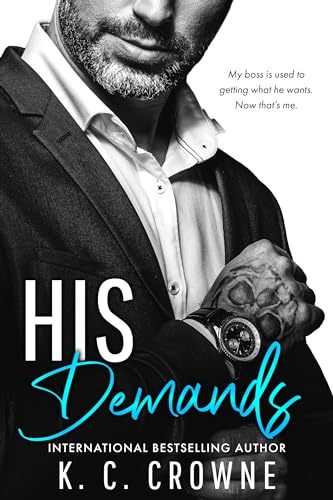
View On WordPress
0 notes
